MEET OUR 14TH DEAN
Usha R. Rodrigues
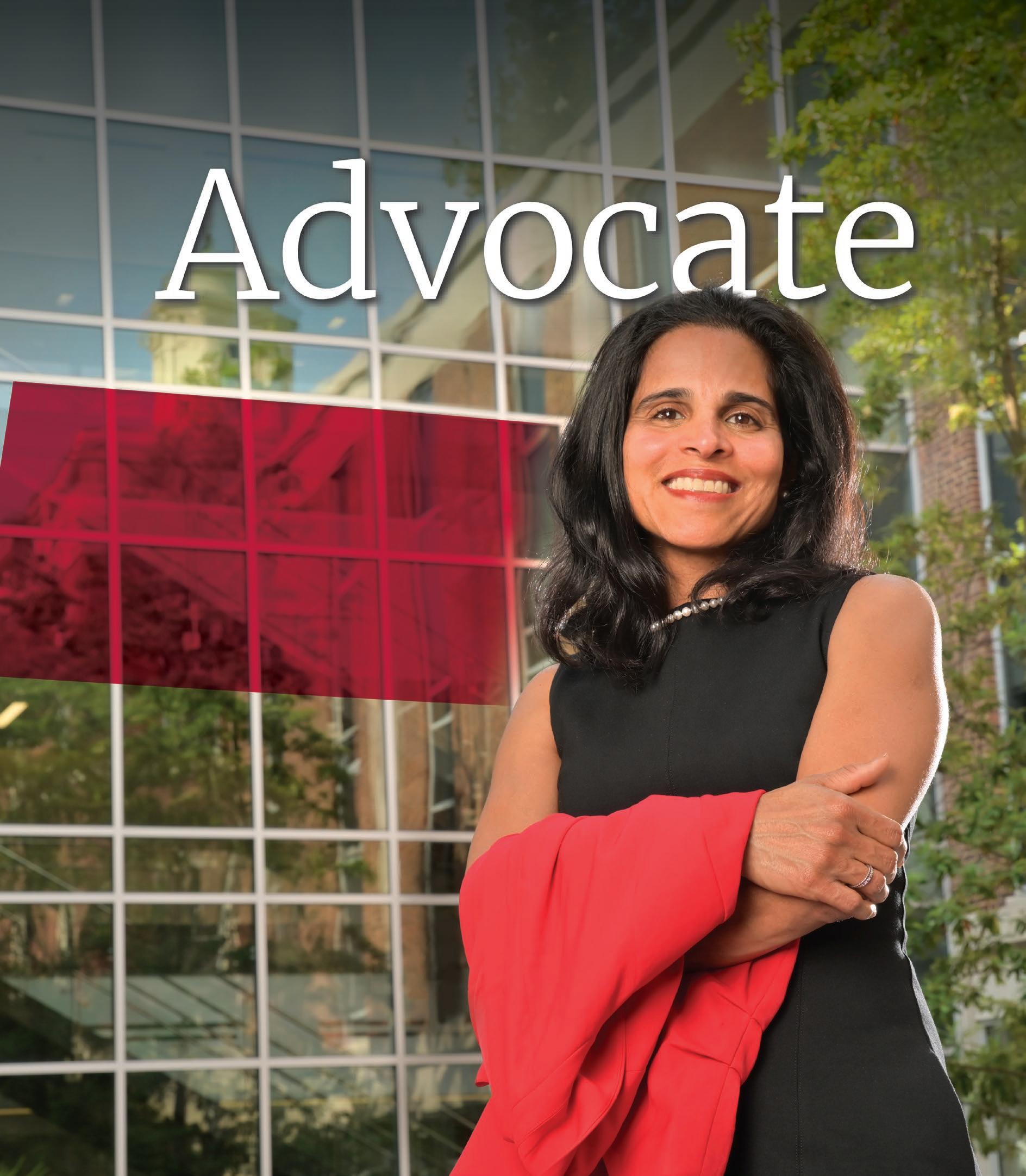

• $2M+ for first-gen scholarships
• Veterans clinic impact grows to $12.5M+
• School launches program addressing rural legal needs
PREPARE. CONNECT. LEAD.

















MEET OUR 14TH DEAN


• $2M+ for first-gen scholarships
• Veterans clinic impact grows to $12.5M+
• School launches program addressing rural legal needs
PREPARE. CONNECT. LEAD.



















8

Honors Fellows help address rural legal needs
VOLUME 59, 2025
ISSN 1557-1025
Editor’s Note: The Advocate is published annually by the University of Georgia School of Law for alumni, friends and members of the law school community. Please contact the Office of Marketing and Communications at (706) 542-5172 or lawcomm@uga.edu if you have any comments or suggestions.
Dean Usha R. Rodrigues


24 Legendary professors retire
Associate Dean for Academic Affairs
Andrea L. Dennis
Associate Dean for Faculty Development
Nathan S. Chapman
Associate Dean for Clinical Programs & Experiential Learning Willow Tracy
Assistant Dean for Admissions & Strategic Initiatives
Xavier R. Brown (J.D.’17)
Assistant Dean for Career Development
Anthony E. “Tony” Waller (J.D.’93)
Email departmental inquiries to: Admissions – ugajd@uga.edu Alumni Relations – lawalum@uga.edu Communications – lawcomm@uga.edu Development – lawgifts@uga.edu Dean Rusk International Law Center –ruskintlaw@uga.edu Law Library – tstriepe@uga.edu Career Development – cdo@uga.edu
Heidi Murphy, editor and writer; Adam W. Wynn, principal writer; Mason A. Brock, student intern; Ava K. Wehrstein, webmaster; mPrint Design Studio, design; Kaptiv8, website design and hosting.
Veterans Legal Clinic impact grows to $12.5M+

Daniels, Rutledge and Alexander receive honors
© 2025 University of Georgia School of Law.
The University of Georgia is a unit of the University System of Georgia. The University of Georgia does not discriminate on the basis of race, color, sex (including sexual harassment and pregnancy), sexual orientation, gender identity, ethnicity or national origin, religion, age, genetic information, disability, or veteran status in its administrations of educational policies, programs, or activities; its admissions policies; scholarship and loan programs; athletic or other University-administered programs; or employment. Inquiries or complaints should be directed to the Equal Opportunity Office at 278 Brooks Hall, University of Georgia, Athens, GA 30602. Telephone 706-542-7912 (V/TDD). Fax 706-542-2822. https://eoo.uga.edu/
The University of Georgia Foundation is registered to solicit in states where required and provides state specific registration information at www.ugafoundation.org/charity.
ABOUT THE COVER: Usha R. Rodrigues, pictured in the Eversheds Sutherland Courtyard, says the School of Law is committed to developing well-rounded graduates who will succeed and thrive in their chosen professions. Photo by Dennis McDaniel.
PREPARE. CONNECT. LEAD.
It is with great pleasure that I write to you as the 14th dean of the University of Georgia School of Law.
I assumed the role of dean on January 1, and so far 2025 has flown by. I have proudly served on this faculty for 19 years, and I thought I knew the law school pretty well. But over the past months the breadth of activity at Georgia Law and the dedication of our faculty, staff, and students has impressed me time and again.
Our law school continues to redefine what it means to be a great national public law school. We aim to produce well-rounded graduates who will succeed – and thrive – as leaders in the profession. We are the nation’s best value law school (and have been for five of the last seven years). We rank among the top 22 law schools in the nation and have by far the lowest tuition among this elite group. Our Class of 2022 graduates posted a 98.95% Ultimate Bar Passage Rate (ranking 12th in the nation), and 95% of the Class of 2024 is employed.
Matching excellence with access, this academic year we committed to awarding an endowed onequarter scholarship to all first-generation college graduates earning a Juris Doctor and launched the Georgia Honors Fellows Program, sending our students and recent graduates to prosecutor and public defender offices in rural parts of our state. The School of Law also hosted approximately 40 judges for a variety of lectures and events. Federal judges from six circuits came to campus. The Georgia Supreme Court even held a special session in our own Hatton Lovejoy Courtroom. With these kinds of ties, perhaps it is no surprise that we rank 10th in the nation for federal judicial clerkships.

I am confident our law school remains on the right path – making excellence in legal education accessible for the next generation.
I have always known our community was blessed with fiercely loyal alumni who will always answer the law school’s call. Since becoming dean, I have felt this connection even more, and I appreciate the warm welcome you have given me. I also want to thank those of you who have funded law school initiatives that will help advance our institution. It was with great joy that we recognized Yvette Daniels (J.D.’89) and Carson Alexander (J.D.’17), along with former Dean Peter “Bo” Rutledge, at our spring awards banquet for their service to the law school and the legal profession. As evidenced in the pages of this magazine, our law school continues to operate from a place of great strength, thanks to the hard work so many have invested in our community. This includes you – our alumni and friends, our dedicated faculty and staff, as well as our talented students. It also includes my predecessors, Peter “Bo” Rutledge, Rebecca Hanner White, and David Shipley, as well as the UGA administration, led by President Jere Morehead (J.D.’80). Additionally, I want to recognize the wise counsel provided by the members of our three alumni boards.
On the faculty front, we have seen a changing of the guard. Longtime professors Dan Coenen and Michael Wells concluded their storied careers with well-deserved retirement, after a combined 84 years of service. They have left an indelible mark on Georgia Law, both inside and outside the classroom, and we miss them already. Even as we bid them farewell, we welcome four new accomplished professors and scholars to campus this fall.
Our students continue to shine in so many ways – academically, in the courtroom, editing and publishing four legal journals, and serving in our 18 clinics and externships. This year, one of our students was chosen as an Academic All-American Trial Advocate and another was selected as a national Law Student of the Year.
While it is still early in my deanship, I am confident our law school remains on the right path – making excellence in legal education accessible for the next generation.
Redefining what it means to be a great national public law school will take all of us working together, focused on the same vision. I encourage you to find your own way to play a part in your law school’s success.
Sincerely,

Usha
R. Rodrigues Dean, University Professor & M.E. Kilpatrick Chair of Corporate Finance and Securities Law





MEET THE 14TH DEAN OF THE UNIVERSITY OF GEORGIA SCHOOL OF LAW
Usha R. Rodrigues, University Professor and M.E. Kilpatrick Chair of Corporate Finance and Securities Law, began her tenure as the 14th dean of the University of Georgia School of Law on January 1, 2025. She recently sat down to answer a few questions and share her thoughts about her new role and her goals as the school’s newest leader.
What do you think sets the UGA School of Law apart from other institutions?
Our students genuinely love being here. Sometimes they feel more loyal to our law school than to their undergraduate institution, and that is something few law schools can say. That enjoyment during their three short years here translates into lasting loyalty to our law school. It makes the UGA Law network unrivaled in its strength.
What is the primary objective you would like for the School of Law to achieve under your leadership?
I believe our law school can differentiate itself by producing well-rounded lawyers – graduates who have the intellectual chops to do the work, of course, but who also can understand a client’s needs, work together as a team, and serve as leaders in the profession and in the community.
How would you describe your leadership style?
I am a listener. I believe in listening to different viewpoints, weighing the competing merits, and then acting decisively.
What advice do you have for current students?
I have told many law students that my best advice is carved on the Temple of Apollo: “Know Thyself” (Bonus that we are in Athens and I am quoting the ancient Greeks!). Law school is about learning about yourself. Do you study better in the library? Or on your own? Do you do your best work in the morning? Or late at night? Do you prefer long projects or shorter, more concrete tasks? There are a lot of unhappy lawyers out there. Serious reflection about what fulfills you is an investment that lays the foundation for a life filled with meaning.
What is the one thing you want alumni to know about you and/or the law school?
Alumni, there is an opportunity for everyone to be involved. Time, talent or financial support – whatever it is you are willing to offer. Georgia Law needs you!
“What attracted me to UGA nearly 20 years ago is precisely what has kept me here: the extraordinary sense of community that we all cherish. It is that shared sense of community that has inspired me to take on this important position.”
While in Washington, D.C., testifying before the U.S. Securities and Exchange Commission Investor Advisory Committee about accredited investors in 2023, Rodrigues caught up with former students Adam Sunstrom (J.D.’18) and Meg Graham (J.D.’22).
At this year’s graduation, Rodrigues was able to catch up with former Dean Peter “Bo” Rutledge.
Photo by Dennis McDaniel.
Earlier this year, Rodrigues received the Choi Mentor Award from the Georgia Asian Pacific American Bar Association during their Lunar New Year celebration. The award recognizes those who demonstrate a remarkable commitment to mentoring the next generation. It was presented to her by former student Shreya Desai (J.D.’18).
Photo courtesy of GAPABA.
Rodrigues at the 124th Sibley Lecture with UGA President Jere Morehead (J.D.’80) (left), former U.S. Deputy Attorney General and Sibley Professor Larry Thompson (center) who presented the lecture, former Dean David Shipley and former Dean Rebecca Hanner White.
In 2018, Rodrigues helped moderate a conversation with 1986 alumna Sally Yates, who had previously served as acting U.S. attorney general and U.S. deputy attorney general, as part of the 36th Edith House Lecture. Photo by UGA Marketing and Communications.


What is something people would be surprised to learn about you?
I did some VERY amateur improv years ago, and it helped me in public speaking and teaching in ways I did not expect. Preparation is essential for the law, but there is also a certain discipline in being present, in focusing on the moment. That requires being open to unanticipated events and trusting in your preparation but also being willing to ad lib.
What is on your reading list these days?
The Libby app (available if you belong to a public library) has transformed my reading habits. Now if I read a book review or reference that intrigues me, I just tag the book on the Libby app and then put it in my hold queue when there’s room. I have 72 books in my queue right now, and another 10 on hold.
What is the best advice you have ever received?
Only decide what you need to decide. Often people project forward in time and talk themselves out of opportunities they shouldn’t. For example, say the question is, should I apply for this job in San Francisco? A student might think, well, if I get it, I might not like the city or decide it’s too far from home or I might be lonely, so I shouldn’t apply. But the only question to decide now is, “Should I apply for this job?” The question right now isn’t if you would take the job – the question right now is, is it worth applying so you have the chance to evaluate it further.
Which individuals in your life have influenced you the most?
My family – my parents, who created a new life for themselves and for me in a foreign country, taught me to work hard and to seek a career I love. My husband, who provides me a sanctuary, a sounding board, and a sense of perspective. And my children (ages 12, 14 and 17), who keep me grounded.
How do you handle the stress of your work?
I am a runner – not fast, but faithful. Always outside, and always with a canine companion or two. It’s as much a mental stress release for me as it is a physical one.
“I am deeply honored to have been chosen as your dean. I look forward to enhancing existing relationships and building new connections as together we strengthen our institution and exemplify what a great national public law school can
and should be.”
OF EXPERTISE
During the 2011–12 academic year, Rodrigues hosted then-AFLAC general counsel Joey Loudermilk (J.D.’78) as a guest speaker in her corporations class.
• Corporate law and securities regulation
• Has testified before Congress and the Securities and Exchange Commission, Member of the American Law Institute
PUBLICATIONS
Author of more than 20 articles appearing in the Virginia, Illinois, Indiana, Iowa, Minnesota, Fordham, Emory, Florida and Washington University law reviews
COURSES TAUGHT AT THE SCHOOL OF LAW
Business Ethics, Contracts, Corporations and Lifecycle of the Corporation
AWARDS/HONORS
• 2019 Selection as University Professor (awarded to no more than one UGA faculty member per year and reserved for professors who have served as “change agents” for the university)
• 2022 Ellington Award for Excellence in Teaching
• 2013, 2022, 2024 Graduation Faculty Marshal
EDUCATION
B.A. in English summa cum laude, Georgetown University; M.A. in Comparative Literature summa cum laude, University of Wisconsin; J.D., University of Virginia, where she served as editor-in-chief of the Virginia Law Review and was inducted into the Order of the Coif
PROFESSIONAL EXPERIENCE
UGA Positions
• 2025 to present School of Law Dean
• 2024–25 (5 months), School of Law Associate Dean 2015–18 for Faculty Development
• 2022–23 (14 months) UGA Interim Vice Provost for Academic Affairs
• 2005 to present Faculty Member
Other Experience
• 2002-05 Corporate Associate, Wilson Sonsini Goodrich & Rosati
• 2001-02 Law Clerk, U.S. Court of Appeals for the Third Circuit Judge Thomas L. Ambro
The School of Law’s vision to redefine what it means to be a great national public law school – one that matches excellence with access – took a huge step forward with the creation of the Hart Family Foundation FirstGeneration Scholarship Fund.
Alumnus E. David Hart Jr. (J.D.’80) was instrumental in the $2-million-plus commitment that now ensures an endowed one-quarter scholarship for all first-generation college graduates enrolled in the Juris Doctor program at the School of Law.
“Being a first-generation college graduate and University of Georgia School of Law graduate, I believe strongly in higher education,” Hart said. “The outstanding education that I received at Georgia Law was very instrumental in our family business’ success. Providing scholarships for other first-generation college graduates is a privilege and a blessing for me.”
There were 77 first-generation college graduates pursuing their Juris Doctor law degrees in Athens during the 2024–25 academic year.
These students are supported by a First Start coordinator and an active First-Generation Students Association and benefit from targeted programming to help them adjust to the rigors of legal study. Since 2021, 100% of firstgeneration college graduates enrolled in the Juris Doctor program at the School of Law have received some amount of financial support.
“This gift is an incredible investment in those who are stepping out of their comfort zones and seeking to make meaningful contributions to society and the legal profession,” Dean Usha R. Rodrigues said.
100% first-gen students to receive endowed 1/4 scholarship (J.D. Program)
Since 2015, the school has been building a portfolio of scholarships to provide at least some financial assistance to all members of this special cohort of students. This gift – when combined with approximately 20 other funds focusing on first-gen scholarships – ensures the school will always be able to provide a meaningful amount of support to those who are the first in their families to earn a college degree and navigate the challenges of law school.
Rodrigues said she is thankful for David Hart and the Hart Family Foundation and their continued generosity and belief in the School of Law and the next generation of legal leaders. “Together, we are creating a model of what a great national public law school can, and should, be.”

Alumnus David Hart (J.D.’80) was instrumental in the creation of the Hart Family Foundation First-Generation Scholarship Fund, which ensures an endowed one-quarter scholarship for all first-generation college graduates enrolled in the J.D. program.
Below: Members of the First-Generation Students Association posing for a photo after a fall meeting are: (front row, l. to r.) Elisa Lara, Eisha Baig, Jordyn Meeks, Jordan Elwarner, Katharine Greene, Deborah Orekoya, Catherine Sheridan, Nada Panjwani, Alexandria Hendricks, Abbie Childers, Justin Davenport, Alex Sotomayor, (second row, l. to r.) Jordan Powell, Gordon Wayne, Franklin Phan, Rosalie Vendrell, Colin Pelletier, Madison Tilton, (back row, l. to r.) Gurshawn Kaler and Edmund Kim.


Since its inception, the Veterans Legal Clinic has had dual goals. One is aiding former members of the military in accessing all of the benefits they are entitled to through the U.S. Department of Veterans Affairs, while the other is giving current law students a hands-on learning experience so they can become skilled legal leaders.
The School of Law is pleased to share that the Veterans Legal Clinic is fulfilling its mission. Since June 1, 2018, the clinic has:
• Amassed an estimated financial impact for veterans of over $12.5 million
• Collectively added more than $10 million in monthly income for veteran clients
More than 140 law students have logged 40,000+ hours of service
• Fielded inquiries from more than 850 military families
• Successfully handled more than 47 client cases
• Spoken with veterans in 94 Georgia counties, primarily outside of the greater Atlanta area
• Logged more than 40,000 hours of service by over 140 law students
“Measuring the impact of a teaching law practice can take many forms,” Veterans Legal Clinic Director and Clinical Professor Alexander W. “Alex” Scherr said. “We can measure impact by the number of inquiries from clients, the number of cases handled, the size of the geographic service area, the number of student hours logged, the amount of benefits secured, or the long-term financial impact.
“We can also look at intangibles for veterans – the recognition and validation of past injuries and of future stability for those who may face homelessness or financial distress. And finally, we can look at the impact that training future lawyers has on their own professional development and their own understanding of the rewards of public service,” he said.
Third-year law student Lindsay M. Smith described the Veterans Legal Clinic as her favorite law school experience. “It offers the opportunity to make a tangible difference in the lives of real people,” she said. “When I started law school … all I knew was that I wanted to use my law degree to help people; thanks to the VLC, I got to start actually helping people much sooner than I ever expected.”
The Veterans Legal Clinic was established through a lead gift from renowned trial attorney James E. “Jim” Butler Jr. The 1977 School of Law alumnus also supports the school’s Butler Commitment, which guarantees financial support for every veteran who enrolls at the law school.
To aid in addressing the scarcity of prosecutors and public defenders in Georgia communities without adequate access to legal services, the School of Law created the Georgia Honors Fellows Program with support from both public and private resources.
The initiative has two parts. The first will provide stipends for up to 10 law students working during the summer months in prosecutor and public defender offices in rural Georgia, while the second will support several School of Law graduates in full-time, longer term positions in these offices.
Both cohorts will participate in intensive training programs organized by Melissa D. Redmon, director of the school’s Prosecutorial Justice Program and a former prosecutor, and Elizabeth Taxel (J.D.’09), director of the school’s Criminal Defense Practicum and a former public defender, before starting in their positions.
“The Honors Fellows Program is a crucial step in addressing the critical shortage of public servants in our rural communities,” Redmon said. “By directly supporting the prosecution offices in these areas, the local justice system is strengthened, and law students have an invaluable opportunity to gain both hands-on practical experience and a deep understanding of the unique challenges rural prosecutors face.”
Taxel said the shortage of public defenders in Georgia’s rural and underserved legal areas has a profound impact on these communities and on the integrity of the legal system. “It’s an honor to support law students
Considered UGA Law’s most prestigious scholarship, the Distinguished Law Fellowship offers unparalleled opportunities for some of the school’s brightest students as they pursue their law degrees. Beyond financial aid, students benefit from domestic and international externships, guided research experiences and opportunities to meet some of the country’s top legal, business and government leaders.

and young lawyers committed to making constitutional rights a reality in every corner of our state.”
This past summer, nine rising second- and third-year students worked in judicial circuits across the Peach State, including the Atlantic, Brunswick, Cordele, Coweta, Dublin, Enotah, Middle, Northern, Ocmulgee and Toombs circuits.
Recent graduate Hannah M. Silvers (J.D.’24) said the Georgia Honors Fellows Program “opened the door” for her dream job in the Tifton Judicial Circuit District Attorney’s Office. She said the School of Law made it possible by giving her the tools she needed to help build her network and participate in internships.
Crediting the Georgia Honors Fellows Program, Silvers said, “I will now have a lasting career that will allow me to give back to my local communities who have given so much to me.”

Over the past year, fellowship recipients enjoyed private lunches with members of the federal judiciary such as U.S. Court of Appeals Judges J. Michelle Childs (D.C. Circuit) and Stephen A. Higginson (Fifth Circuit) and U.S. District Court Judge for the District of South Carolina Richard M. Gergel. Additionally, first-year fellows had the opportunity to connect with members of the school’s alumni boards and with many of their benefactors at receptions.
Initially established in 2016 by a gift from The John N. Goddard Foundation, the Distinguished Law Fellowship program currently has the ability to offer more than 25 full-tuition-plus scholarships. The program is modeled after the university’s prestigious Foundation Fellows initiative, which was established in 1972.
Distinguished Law Fellowships not only provide scholarships and professional development opportunities to support students in achieving their academic and career goals, the program also fosters a close-knit and supportive cohort across the various class years. At a Board of Visitors reception earlier last academic year are second-year students (l. to r.) Hannah Peters (Motz Fellow), Sydney McRae (Wilson Fellow) and Catherine Brennan (Edge Fellow).
SEASON HIGHLIGHTS

Third-year students (l. to r.) Casey Wofford, Taylor Stablein and Mona Abboud finished as semifinalists at the National Moot Court Competition in New York City. The trio also went undefeated at their regional tournament in Atlanta. The National Moot Court Competition features more than 150 accredited law schools participating in this prestigious annual tournament involving more than 1,000 students.

Third-year student Drake Jones (second from right) was named best advocate at the National Trial Competition while he and his teammate, second-year student Dresden Day (second from left), finished as semifinalists and were named the most professional team. Second-year students Ethan Thomas (left) and Brianna House (right) served as witnesses. Jeremy Dailey (J.D.’14) and Haley Kairab (J.D.’22) coached the team. Administered by the Texas Young Lawyers Association, this year’s competition attracted more than 300 teams from at least 150 law schools nationwide.

Third-year students (l. to r.) Emily Wood, Garfield McIntyre and Hannah Ryninger finished as semifinalists at the 2025 Hicks Thomas LLP Moot Court National Championship with Cole Harper (J.D.’22) serving as coach. Additionally, McIntyre was named best advocate of the competition. This annual invitation-only tournament is reserved for the top 16 moot court programs from law schools across the country based on performances from the previous academic year.

LL.M. students (l. to r.) Fabienne Teller, Danish Ali, Samuel Kuo and Paria Kermatkhah won the LL.M. International Commercial and Investment Arbitration Moot Competition under the coaching of former Dean Peter “Bo” Rutledge and third-year student Gloria Correa (LL.M.’23). This event was created specifically for LL.M. students to foster the study of international arbitration for the resolution of international business and investment disputes.
Third-year student Drake Jones was named an inaugural Academic All-American Trial Advocate by the National Association of Legal Advocacy Educators. Jones is one of 20 students nationwide to receive the honor, which recognizes students who have had exemplary success in courtroom advocacy competitions, modeled good leadership and fellowship within the law school community and excelled academically.
Jones also represented UGA at the Top Gun XVI National Mock Trial Competition, an elite, invitation-only tournament for law schools that have excelled at mock trial tournaments during the past year.


Second-year students Taylor Hoying (left) and Kero Gadelrab won their American Bar Association National Appellate Advocacy regional competition. They were coached by Holly Pierson (J.D.’96) and third-year students Taylor Stablein and Garfield McIntyre.
Third-year students Robert J. “Bob” Anderson and Daisy Gonzales finished third in the ABA Law Student Tax Challenge. This competition gives J.D. students an opportunity to solve a complex business problem that might arise in everyday tax practice. There were 84 teams from around the country competing in this year’s contest.
Second-year student Allison L. Brown designed and trained the first-place prompt in the Value Created category at the inaugural MIT AI Negotiation Competition. Entries from over 25 countries engaged in an estimated 250,000 negotiations. The MIT AI Negotiation Competition is a project of the MIT Initiative on the Digital Economy that incorporates large language models into the field’s history of computer-based tournaments.
Second-year students Grace M. Craft and Supreme Unukegwo completed the Transatlantic Negotiation Competition as quarterfinalists. A program of the Syracuse University College of Law and Queen’s University Belfast, this dual-sponsored event gives law students around the world an opportunity to negotiate disputes and client agreements in a transnational setting.
During the 2024–25 academic year, the Appellate Litigation Clinic argued six times before three federal appellate courts. Led by Director Thomas V. Burch, current students and recent graduates worked on the following cases:
• Third-year student Zachary D. Poppe argued the case Holley v. Combs before the U.S. Court of Appeals for the Fourth Circuit. Third-year student Taylor L. Stablein helped write the briefs and prepare the argument. The court ruled in favor of the clinic.
• Also in the Fourth Circuit, third-year student Joseph M. “Joe” Colley argued the case Qaiymah v. McHenry. Third-year student Garfield A. McIntyre Jr. assisted with writing the briefs and preparing for argument. Class of 2011 alumnus Benjamin J. “Ben” Osorio partnered with the clinic on the case.
• Before the U.S. Court of Appeals for the Eleventh Circuit, Stablein argued Smith v. Dewberry. Poppe aided her in preparation for the argument while alum Mark Bailey (J.D.’22) briefed the case.
• Third-year students Robert A. “Bobby” Bellen and Natalya D. Moody also argued Bilal v. Benoit before the Eleventh Circuit with third-year students Anna E. Gowen, Caleb Z. Morris and Anderson B. Scott assisting with preparation.


Third-year student Joe Colley (right) argued before the U.S. Court of Appeals for the Fourth Circuit. Third-year student Garfield McIntyre Jr. assisted with the briefs and preparations for the argument.
• McIntyre argued Cabrera v. Islamic Republic of Iran before the U.S. Court of Appeals for the D.C. Circuit. Second-year student Benjamin Sterner “Ben” Michaud helped draft the brief, along with 2024 graduates Allison J. Fine, E. Hope Garrison, Leila Y. Harrison, Benjamin K. “Ben” Price and Madeleine B. “Maddie” Hoss.
• Additionally, both McIntyre and Stablein briefed and argued N’Jai v. Department of Education, et al. before the District of Columbia Court of Appeals.
The School of Law’s 18 clinics and externships not only provide an excellent opportunity for hands-on student learning, they also offer legal support and services for those in need in the Athens area and beyond. Below are a few highlights from the past year.
For the second consecutive year, UGA Law participated in a legal pop-up clinic in Troup County, offering free civil legal advice and referrals to residents with support from a Callaway Foundation grant. Veterans Legal Clinic Director Alexander W. “Alex” Scherr, third-year student Cameron F. Goodman and second-year student Supreme Unukegwo – both with the Public Interest Practicum – participated in the late-October event. The 2024 clinic – co-hosted by the School of Law, Troup County courts and the Georgia Legal Services Program – assisted more than 40 individuals seeking consultation, twice the number served by the 2023 clinic.
The First Amendment Clinic presented an argument before the U.S. Court of Appeals for the Eleventh Circuit in March. Third-year student Grace Lane and Clare Norins, the clinic’s director, argued the case Sullivan v. Prospero, while former legal fellow Allyson Veile assisted Norins with writing the brief.
Through a generous grant and support from the Georgia Criminal Justice Coordinating Council, the Wilbanks Child Endangerment and Sexual Exploitation Clinic launched the Survivors First Vacatur Project in 2025. This initiative identifies trafficking survivors eligible for post-conviction relief under the state’s Survivors First Act and connects them with pro bono attorneys trained by the Wilbanks CEASE Clinic to provide trauma-informed representation.

Third-year student Jacob Blott (right) and Dean Usha R. Rodrigues celebrate his selection as a Law Student of the Year by National Jurist. He was one of five students nationwide to receive this honor, due in large part to his consistent efforts to improve the law school experience for his fellow students. Blott served as the Student Bar Association president for 2024–25.
Third-year student
Caleb Morris (right) and Associate Dean Andrea Dennis (center) worked with Richard Dunn of the local nonprofit Education Matters to establish the Classic City Civics Project with a $3,000 grant from the Foundation of the Federal Bar Association. This collaborative initiative is designed to provide local schools with resources to engage students in understanding the law, government and citizenship.


More than 25 Law Dawgs participated in the Professional Programs Mixer at the Georgia Museum of Art in April. The event brought together students from all of the professional schools at UGA, including pharmacy, medicine and veterinary medicine.
For third-year student Anna H. Barrett, who came to law school to pursue a career in public interest law – specifically public defense work – financial support was essential to gain legal experience in the field during the summer months of law school.
At UGA Law, summer fellowships are a priority for those seeking legal work in nonprofits, federal and state government, judicial clerkships, legal services and policy/ impact organizations. Over the past five years, the school has awarded more than $1.5 million to students in these unpaid positions, thanks to contributions provided by alumni and friends.
Roughly 85 students used their fellowships this past summer to pursue legal work throughout the state of Georgia and the country, including California, Idaho, Texas and Pennsylvania. Fifty students worked in public interest and government placements (with 10 serving in rural counties of Georgia), while 33 worked in judicial chambers.
As for Barrett, who received the largest annual public interest grant offered by UGA Law – the Bool Simkins Fellowship – she spent the summer gaining legal experience at the Southern Center for Human Rights in Atlanta. She said she was pleased to have the opportunity “to represent an incarcerated person in proceedings before the Alabama parole board, visit and interview clients, and, of course, do plenty of legal writing and research.”
Grants exceed $1.5 million over five years

Third-year student Anna Barrett, who received the largest annual public interest grant offered by UGA Law – the Bool Simkins Fellowship – spent the summer gaining legal experience at the Southern Center for Human Rights.
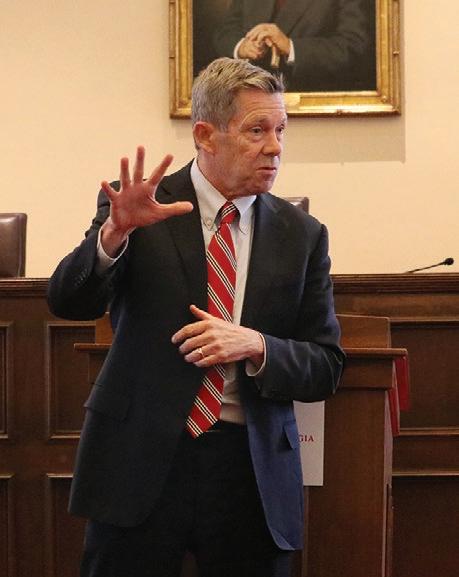
Multiple student groups organized timely discussions and conferences on current topics for members of the legal community during the 2024–25 academic year. Some of these events are highlighted below.
• State constitutions took center stage at the 2025 Georgia Law Review symposium titled “A Nation of States: State Constitutional Rights in the Modern Era.” Chief Judge Jeffrey S. Sutton of the U.S. Court of Appeals for the Sixth Circuit delivered the keynote address. The event also hosted state Supreme Court justices from three states who served as panel moderators, including Georgia Supreme Court Justice Sarah Hawkins Warren.
• The Journal of Intellectual Property Law held its annual symposium in March, exploring applications of IP law across agriculture, music and advertising. Anuj Desai (J.D.’07) of Arnall Golden Gregory served as one of the speakers and discussed intellectual property as it relates to advertising.
• The Georgia Criminal Law Review welcomed judges, public defenders, scholars and practitioners to their 2025 symposium titled “A Journey Through the Criminal Justice System.” The event examined topics like prison culture, criminal behavior and life after prison. Panelists included Emerging Scholar Shanée Brown and Adjunct Professor W. Matthew Dodge.
• The 37th Annual Red Clay Conference, organized by the Environmental Law Association and titled “Grassroots Advocacy for People and Planet,” brought lawyers, professors and community leaders to campus to discuss ways the law can help preserve the country’s limited natural resources. The four panels focused on issues such as environmental education, community partnerships and preserving public spaces.
• Members of the law school student group The Law & Political Economy Collective hosted “Movement Lawyering: A Law & Social Impact Conference” in the spring. This event brought several esteemed academics and lawyers to campus.
Authentic partnerships and connections provide an important foundation for all programs and activities at the School of Law. A perfect example is the recent collaboration of the University of Georgia Foundation, the law school, and graduates and friends increasing scholarship support for the student body, including the creation of 11 new funds.
During the 2024–25 fiscal year, the foundation announced special initiatives, offering limited-time matching opportunities for donors to establish or expand scholarships. This effort generated more than 20 new commitments for the School of Law – totaling $1.1 million – creating a powerful investment that will impact hundreds of students for years to come.
One 2014 alumnus who saw the value in this partnership is David B. Dove, who also serves on the Law School Alumni Council and is a member of the University System of Georgia Board of Regents. David said he and his wife Courtney “feel strongly that investment in a scholarship fund not only ensures the success of Georgia Law for the next generation, but also provides the opportunity to directly impact the lives and future success of our students.”
Dean Usha R. Rodrigues said support from donors like the Dove family and the 21 other donor representatives is crucial to the ongoing success of the law school.
“All of the things that make our school great – our faculty, our students and their educational experiences – take resources,” she said. “I appreciate these alumni and friends for answering the call. Their support, coupled with that of UGA President Jere W. Morehead (J.D.’80) and the UGA Foundation – under the leadership of Chair Allison C. Ausband – is helping our institution to redefine what it means to be a great national public law school, one that matches excellence with access.”
The following is a list of funds benefiting from UGA Foundation match funding:
• Barrett Law Scholarship Fund
• C. Andrew (Andy) Childers Scholarship Fund
• Dallas and Gobeil Families Endowment Fund
• Dove Family Student Leadership Scholar Fund
• Gabriel M. Wilner Scholarship Fund
• Garland and Betty Cook Scholarship Fund
• George Gardiner Thompson Scholarship Fund
• Georgia Roots Endowment Fund
• Hunter Family Scholarship Endowment Fund
• Joel O. Wooten Distinguished Law Fellowship Fund
• Judge B. Avant Edenfield Scholarship Fund
• Kenneth M. Henson Distinguished Law Fellowship Fund
• Law School Mission Endowment Fund
• Luciani Family Endowment Fund
• Peter B. (Bo) Rutledge Family Scholarship Fund
• Peter J. Shedd Scholarship Fund
• Rajesh “Raj” Mehta Memorial Endowment for Family Justice Fund
• Reggie and Leigh Smith Law School Scholarship Fund
• Robert E. (Robbie) Robinson Endowment Fund
• Stacey Godfrey Evans Scholarship Fund
• Susan A.J. Wilson Scholarship Fund
• Zimmerman Family Endowment Fund
Ever since she was young, second-year student Sophie E. Funderburk knew she wanted to attend law school. However, after graduating from Davidson College, she decided immediately pursuing her legal education was not the best decision.
“I think that was an important realization for me – for my journey to go a slightly different way before coming back to law school,” she said.
Funderburk’s grandfathers inspired her next steps. One served in the U.S. Marine Corps, while the other served in the Navy. Their dedication to service resonated with her and influenced her decision to pursue U.S. military service.
“I was afraid, but I called the Marine recruiter anyway, and I had a great conversation with him,” Funderburk said. “It felt like a challenge, like I wasn’t sure that I would make it. The attrition rate for females was very high at the time – about two-thirds of the women who joined did not make it through Officer Candidates School – but that honestly felt like the right time for me, where I was in life.”
Funderburk joined the Marines in 2011. Though she originally planned to stay for four years, she ultimately served on active duty for 11 years and completed three deployments.
“It took me a little bit longer to come back to school because I fell in love with the Marine Corps,” she said. “I fell in love with the culture and the experiences that I had.”
A native of Wilmington, North Carolina, Funderburk wanted to return to the Southeast for law school to be closer to her family and friends. The School of Law stood out to her for its value, environment and leadership.
After her time away from education, the transition to law school was initially challenging for Funderburk. “I could
Recent graduate Anna C. “Carolina” Mares has always been passionate about international affairs, an interest rooted in her multicultural upbringing. She spent part of her childhood in Spain, her mother’s native country, before permanently moving to Georgia at the age of eight.
Her international background influenced her decision to become a French and Spanish middle school teacher, a career she enjoyed for 10 years in Atlanta.
“[My early career choice] shows that my connection to languages and culture is a really meaningful part of who I am,” Mares said. “It’s a big part of my identity.”
Dedicated to sharing different cultures with her students, she helped create her middle school’s first French exchange program
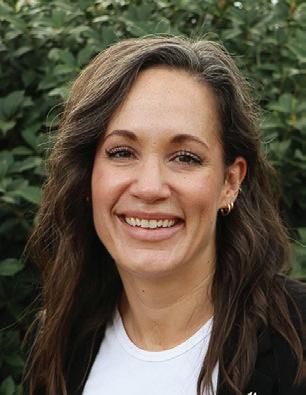
have easily not come back,” Funderburk said. “But it was something that kept gnawing at me. At every season of my life, it came back.”
Her parents have been her greatest source of motivation, supporting her throughout each phase of her journey – from military service to law school.
“I think it goes a really long way knowing that, if I fail, it would not change anything about my mom’s and dad’s feelings for me. If I am top of the class, it won’t change their feelings for me,” Funderburk said. “They’re there to fiercely support me in whatever it is that I end up doing.”
This past summer, Funderburk was a legal intern for Senior Judge Richard Leon in the U.S. District Court for the District of Columbia. The experience aligned with her interest in litigation as well as her broader goal of working in the Washington, D.C., area after she graduates.
Beyond academics, she has found a strong and supportive community at UGA. “I’m always in awe of the alumni network that this school has, whether it’s the undergrad or the law school network,” Funderburk said. “It’s such a large but tight-knit network of people, and I’m very thankful to be a part of it.”
Funderburk, who is a recipient of the Butler Distinguished Law Fellowship, remains focused on making an impact through the relationships she builds through her experiences.
“I think that the key takeaway for me – when I look back on my life and my success or something that I’m proud of – is the people who I was around and was able to impact or who impacted me and who changed my life and my trajectory,” Funderburk said.

and published El Laberinto Secreto, a historical fiction novel tailored to her students’ level of Spanish proficiency.
Her passion for teaching and inspiring her students was a significant part of her decision to attend law school. “I kept telling my students, ‘You are going to be the ones who go and make the change,’” Mares said. “After a while, I thought I could do it too.”
Mares views the legal profession as an opportunity to continue learning and writing about global issues while becoming an agent of change. This mindset helped her thrive at the School of Law, where she pursued multiple careerbuilding opportunities.
Attending the University of Georgia School of Law was an “easy choice” for third-year student Antavious L. “Ant” McCarden. He earned his bachelor’s degree at UGA, so when choosing to do his legal studies in Athens, he was already familiar with the campus and invested in the Bulldog community.
“I think getting involved as an undergrad student was one of the best things I could have done,” McCarden, who served as an orientation leader, said. “That passion and that connectivity that I felt as an undergrad student carried over to the law school and encouraged me to want to get involved here.”
McCarden has held leadership positions in the Student Bar Association all three years, and he is currently serving as 3L class president. One of his favorite activities is organizing SBA tailgates before football games.
“It’s nice to be able to couple that fervor for the athletic department and the football team with the law school community,” McCarden said. “It’s fun to see my classmates not in the law school or with their head face-first in a book. It’s just fun to be able to build community that way.”
He values relationships with not only his classmates but also his professors. He makes an effort to engage with them about class material, professional advice and life in general.
“I feel like I have great relationships with almost all of my professors, which really speaks to the character and the quality of professors that we have here,” McCarden said. “They’re not just worried about the academics – they actually care about the students.”
McCarden, a recipient of the Judge Steve C. Jones Scholarship, has also gained guidance from School of Law alumni. He met Brian P. Cain (J.D.’87) at a Board of Visitors event where McCarden was a featured student speaker. That connection led to McCarden working at

Cain’s firm – Holt Ney Zatcoff & Wasserman – during the summer after his first year of law school. He returned to the firm the following summer.
“It was an awesome opportunity – my first legal job, great mentors, people who were really in tune and intentional about wanting to teach and explain, rather than just to direct and hope for the best,” McCarden said.
He values the support he has received from Cain and all of his mentors throughout his education.
“It takes a village to get to this point, and I’ve had a lot of great professors – and teachers in my earlier years – who have poured a lot into me and encouraged me to be the best version of myself,” McCarden said.
He added that he especially appreciates his parents for all they have done for him. Being an only child, much of McCarden’s college experience involved him and his parents facing things together.
“I am trying to give back to the work and intentionality that my parents have had in raising me,” McCarden said. “I just want to make my parents as proud as possible, while also making myself as proud as possible.”
Although McCarden is still deciding on a career path, he knows he wants to continue fostering the sense of community and connectivity on which he thrives.
“Hopefully I will be somewhere where I feel connected not only to the local community but also to whatever my work experience will be – somewhere I can make a difference and hopefully be a resource to others who will come after me,” McCarden said.
As part of the Washington, D.C., Semester In Practice program, Mares completed an externship in the Office of the Legal Adviser at the U.S. Department of State, working with attorneys who assist policymakers with implementing foreign policy.
“There was so much focus on alleviating human suffering through diplomacy – through cooperation – and I saw that these attorneys carried the values that I want to have in my future career,” Mares said.
She also participated in the Global Externship Program after her first year, working in Tunisia at a specialized international arbitration firm. “I worked on cases related to oil and gas in Dubai and procurement in North Africa, and all of it was exhilarating and fascinating,” Mares said.
These offerings were a key factor that drew Mares to the School of Law. “Those were very unique opportunities, and the fact that UGA has supported that shows the school understands that practicing in an international context requires more than just theoretical knowledge,” Mares said.
She added that her husband is the reason she was able to pursue her legal education. His decision to change careers from wholesale landscaping to information technology influenced Mares to change her own career path.
“[Attending law school] felt so much more feasible and realistic, because I had seen my partner do the same thing already,” she said.
Mares currently works at Alston & Bird, where she will serve for one year before clerking for Judge Michael L. Brown (J.D.’94) in the U.S. District Court for the Northern District of Georgia.
She said she is grateful she approached law school with curiosity and explored a variety of opportunities.
“Keeping an open mind and working to find opportunities that are on the path less traveled can be challenging, but I found that UGA has so many people who are willing to mentor – whether it’s classmates, whether it’s people in the field or whether it’s professors,” Mares said. “And if you keep an open mind, people are there to help you explore all the opportunities available.”

Photo by Dennis McDaniel.
Speaking to the newly minted Class of 2025, Chief Judge for the U.S. District Court for the Southern District of Georgia R. Stanley “Stan” Baker (J.D.’04) said that it was time for the graduates to create their own story and to keep working on that story every day.
“Don’t mistake that diploma you received today as a license to end your education. Remain a student until you take your last breath,” Baker advised.
During his remarks, Baker also made special note of several key individuals who have helped write the story of the School of Law.
Baker centered much of his discussion on advice he heard from University Professor, Meigs Distinguished Teaching Professor & Caldwell Chair in Constitutional Law Dan T. Coenen, who retired during the academic year along with Carter Chair in Tort and Insurance Law Michael L. Wells. After Baker delivered what he believed to be an exemplary answer to a cold call in Coenen’s contracts class during his first year of law school, he heard the professor say, “Now argue against yourself.”
Regarding this response, Baker noted, “What I’ve come to grasp in the decades since, that I failed to realize that day, is that hidden in those four words were innumerable values.”
Chief among those values might be that the student’s opinions, no matter how brilliantly conceived, could be wrong. “Have the courage of your convictions, but with the humility to admit your own fallibility,” Baker said.
In addition to retiring academics Coenen and Wells, Baker took time to highlight the change in leadership brought about by former Dean Peter B. “Bo” Rutledge’s resignation, which led to Dean Usha R. Rodrigues’ ascension in January.
“Now in Athens, better never rests,” Baker stated, borrowing a quote from UGA Head Football Coach Kirby Smart. “So where one legend exits stage right, another legend in the making enters stage left. Dean Rodrigues, we are so honored that someone so talented, so dedicated, so beloved will lead our law school during our next chapter.”
Baker completed his remarks by telling the graduates to create a story about which they can be proud. “Write a story where you have passion for the law, but the law is not your passion.”
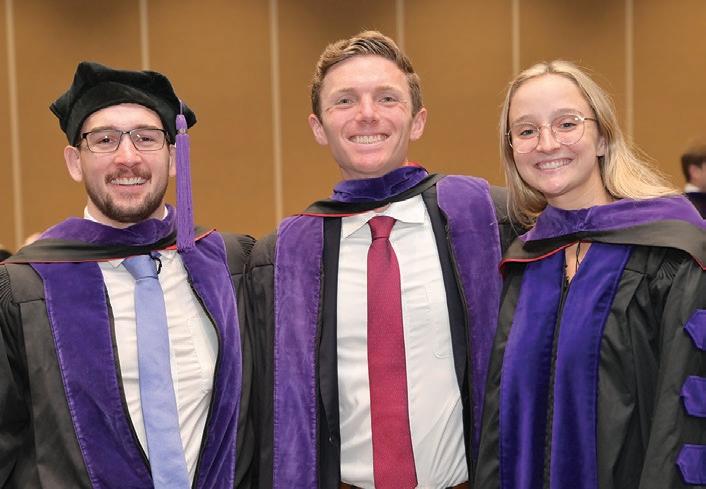



Law School Alumni Council President Tim Lee (J.D.’10) welcomes the graduates to the ranks of more than 11,400 School of Law alumni living and working around the globe. Photo by




Two distinguished speakers with extensive ties to the School of Law delivered Sibley Lectures during the academic year. University Professor & Caldwell Chair in Constitutional Law Dan T. Coenen took the podium in October and former U.S. Deputy Attorney General Larry D. Thompson, who also holds the school’s Sibley Professorship in Corporate and Business Law, spoke to the law school community in March.
Coenen’s lecture, titled “Mystery, History, and the Dormant Commerce Clause Rule,” framed a conversation on constitutional law around the Dormant Commerce Clause Rule.
“Put simply, the Dormant Commerce Clause Rule has to do with making the United States genuinely united, and united in a way that was of the highest importance to our nation’s founders,” Coenen explained.

He argued that the U.S. Supreme Court’s ability to strike down state laws that run counter to or alter the nation’s ability to operate as a single economic market is crucial to the function of the federal government.
Displaying the academic rigor that has marked his classes for nearly four decades, Coenen took the time to discuss how differing critical lenses support his point despite historical and contemporary arguments to the contrary.
“It’s the very depth of the dive into the historical materials that has convinced me that the textualist and originalist case in support of the Dormant Commerce Clause Rule is extremely strong, and it simply takes a lot of explaining,” Coenen elaborated.
A professor at the School of Law since 1987, Coenen retired at the end of the academic year.
His scholarship in constitutional law has brought Coenen a great deal of renown, but it is his gravitas and reputation among his former students that have made perhaps the most lasting impression. In her introduction of the lecture, 1995 alumna Julia A. Houston made sure to mention how Coenen’s class was the one where she “most dreaded getting called on.” As difficult as her experience was during one particular moment, Houston went on to say that, “The sun still came up the next day. My law career was not over. I remember it to this day … because the lessons Professor Coenen taught me were more important than contracts.”
In the spring of 2024, Houston created the Dan T. Coenen Scholarship Fund in his honor.

Thompson spoke on his life experiences, with special attention given to his time working in the upper echelon of the American justice system as the U.S. deputy attorney general. Delivering remarks and memories that are also featured in his book, Quiet Counsel: Looking Back on a Life of Service to the Law, Thompson made mention of his unique relationship to the terrorist attacks on Sept. 11, 2001, which occurred just five months into his service in the Bush administration.
“I felt like I had failed,” Thompson said, recounting his feelings after the attacks. “I felt like my job … was to protect citizens.”
With an emphasis on the rule of law and the civil rights of the American people, Thompson discussed how crucial it is for the government to defend citizens from acts of terrorism without succumbing to the temptation toward absolute power.
“I do not want to give the government … a blank check to do anything they want,” Thompson noted frequently throughout his speech, mentioning his previously proposed plan for a national security court within the federal government.
Though the bulk of his presentation centered around national security and his time in public service, Thompson also discussed corporate responsibility while remembering his work in the wake of Enron and other prominent corporate fraud cases.
During a meeting with then-President George W. Bush, Thompson took the lead in explaining how corporations were taking advantage of people and defrauding investors.
“We gave President Bush examples of that, and I will never forget this,” Thompson said. “President Bush then turned to one of his economic advisors and said, ‘We can’t let people get away with this, can we?’”
Thompson also recalled the encouraging words he heard from the president at the end of their meeting that day: “L.T. … good job. Keep up the good work.”
The Sibley Lecture Series, established in 1964 by the Charles Loridans Foundation of Atlanta in tribute to the late John A. Sibley, is designed to attract outstanding legal scholars of national prominence to the School of Law. Sibley was a 1911 graduate of the law school.

Earlier this year, the School of Law was counted among the top 22 international law programs in the country by U.S. News & World Report. The school’s influence in international law stems from the Dean Rusk International Law Center’s leadership team of faculty co-directors Diane Marie Amann (Regents’ Professor of International Law & Woodruff Chair), Christopher Bruner (Stembler Family Distinguished Professor in Business Law) and Desirée LeClercq (Assistant Professor) as well as Director Sarah Quinn.
Chief among the center’s activities this past academic year was the “Defending Democracy: A Comparative Perspective” conference held in partnership with the Georgia Journal of International and Comparative Law Organized by Hosch Professor & Meigs Distinguished Teaching Professor Lori Ringhand, this full-day symposium brought together comparative law scholars from across the country to discuss a range of issues involving democracy, democratic backsliding and comparative constitutional protections of democratic norms and institutions.
The International Law Colloquium, overseen by LeClercq, focused on international economic law and featured Harlan Cohen (Fordham Law), Luwam Dirar (Western New England University School of Law), Katrin Kuhlmann (Georgetown Law), Olabisi Akinkugbe (Schulich Law), Ben Heath (Temple Law), Julian Arato (Michigan Law), Trang (Mae) Nguyen (Temple Law),
To strengthen the school’s academic partnerships abroad, four faculty were selected to serve as Rusk Scholars-in-Residence. Amann, Associate Dean Nathan Chapman, Associate Professor Thomas Kadri and LeClercq travelled to and spoke at leading academic institutions and organizations like Oxford University, the European University Institute, the University of Queensland, the International Labor Organization and the World Trade Organization, among others.
The school furthered its partnerships with the Atlanta International Arbitration Society, the American Society of International Law and the American Branch of the International Law Association. A total of 22 students received Sohn Professional Development Fellowships to attend conferences sponsored by these groups in Atlanta, New York City, Chicago and Washington, D.C. In conjunction with the Washington International Trade Association, the center organized a webinar about careers in international trade and law.
Other featured speakers throughout the year included representatives from the Permanent Mission of the Arab Republic of Egypt to the African Union in Ethiopia, the International Court of Justice, the UN Working Group on Business and Human Rights and USAID’s Bureau for Democracy, Human Rights, and Governance.
American TV personality Jack Ford delivered a special lecture during the fall semester, which was co-sponsored with the UGA School of Public and International Affairs. Throughout his multifarious career – spanning the fields of journalism, law and academia – Ford has earned three Emmys and a George Foster Peabody Award. For three years, he was a prosecutor in New Jersey before entering private practice. He has handled such high-profile cases as the Northeast’s first death penalty case, one of the nation’s first corporate homicide trials and the Wall Street insider trading scandal of the late 1980s. Ford also taught at Yale University, New York University and Monmouth University, among others. In addition to being a prominent television news anchor for many years, Ford is a best-selling author of three novels and an ESPN college football commentator.
Eighteen foreign-trained lawyers came to Athens for the 2024–25 academic year to earn a Master of Laws. They hailed from 13 countries in Africa, Asia, Europe and the Americas. Six LL.M. students were selected as graduate editors of the Georgia Journal of International and Comparative Law, and four won the LL.M. International Commercial and Investment Arbitration Moot Competition.
UGA Law students remain excited about international experiences. Four students opted for semester-long externships, including the first two recipients of a grant from the Halle Foundation supporting externships in Germany. This past summer, 16 students secured Global Externships in public and private law placements in Belgium, Bermuda, Cambodia, Germany, Italy, Latvia, Malta, New Zealand, Spain and Vietnam. One student received the Asia-Georgia Internship Connection Scholarship for his externship with KPMG in Vietnam. Eleven law students and two Graduate Certificate in International Law students participated in the Global Governance Summer School, which is conducted in partnership with the KU Leuven Centre for Global Governance Studies. Additionally, one student enrolled in the 2024 University of Liverpool School of Law & Social Justice Summer School in partnership with the Council of Europe.


Two federal judges, U.S. Court of Appeals Judge J. Michelle Childs and U.S. District Court Judge Richard M. Gergel, recounted stories from the Civil Rights Movement at the 2024 Judge Horace J. Johnson, Jr. Lecture.
An enlightening discussion on judicial courage, inspired by Gergel’s book Unexampled Courage, the lecture explored how individual bravery and the resolve of the judiciary were pivotal in achieving monumental victories during the Civil Rights Movement.
Gergel discussed the intersection between the judiciary’s response to justice and the demands for equal treatment from Black veterans returning from World War II, while Childs shared inspiring stories of federal judges who helped drive the movement by consistently upholding the law in the face of threats and violence.
With support from the university, the School of Law and the School of Public and International Affairs established the Judge Horace J. Johnson, Jr. Lecture in memory of the late jurist, who was a trailblazer in Georgia and a 1982 School of Law alumnus.
The Supreme Court of Georgia held oral arguments for three cases in the Hatton Lovejoy Courtroom during February, with the goal of making the court’s business and the judicial process more accessible to the public.
This up-close access provided an extraordinary opportunity for UGA Law students to experience the Supreme Court’s work firsthand, according to Dean Usha R. Rodrigues. “We deeply value the longstanding relationship between the court and our law school, and our students learned from a day of stimulating debate and thoughtful argumentation.”
During the 2024–25 academic year, School of Law students also benefited from interactions with other members of the judiciary through guest lectures, conferences and panels, and moot court and mock trial competitions, among other on-campus activities.
38 judges/justices connected with law students on campus

In total, 38 judges and justices came to Athens and connected with law students. Nineteen were members of the federal judiciary and included judges from the 4th, 5th, 6th, 10th, 11th and D.C. Circuit Courts of Appeals. Eleven were state Supreme Court justices. In addition to the state of Georgia’s highest court, the Supreme Courts of Hawaii and Florida were represented at the law school.
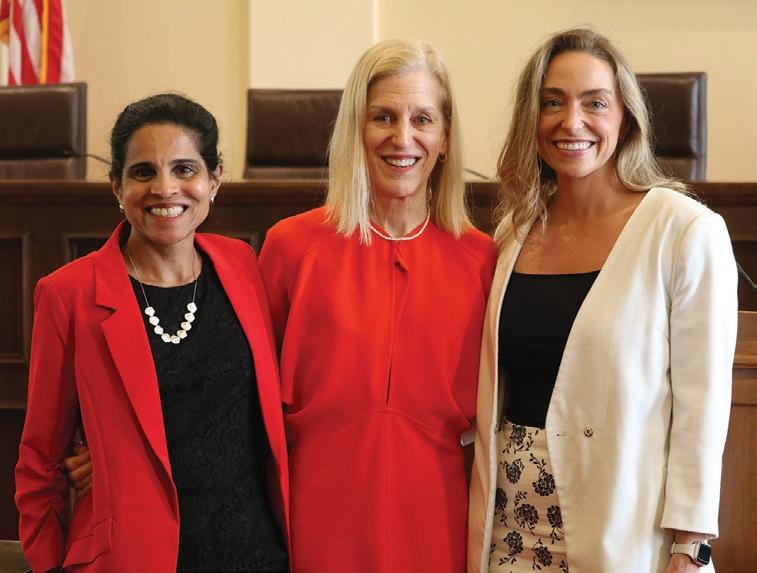
Beverly B. Martin, a 1981 graduate of the School of Law, delivered this year’s Edith House Lecture. Martin served as a judge on the U.S. Court of Appeals for the Eleventh Circuit from 2010 to 2021. Prior to that, she was a U.S. District judge for the Northern District of Georgia for nearly a decade.
Delivering her lecture in the Hatton Lovejoy Courtroom, a room which bears a painted portrait of her, Martin spoke about the importance of being a leader and observed that students may become leaders whether they plan to or not.
Martin shared stories from her own career in the law, as well as stories of other lawyers who showed how crucial it is for those in the legal field to lead courageously and morally.
Though she is no longer on the bench, Martin has maintained her service to the community, recently working as the executive director of the New York University School of Law Center on Civil Justice.
As she closed her speech during the most recent House Lecture, which was notable for marking the 100th anniversary of House’s graduation as one of the first two women to earn a law degree from UGA, Martin briefly reminisced on the last time she had stood in that courtroom.
It was, in fact, the day that her portrait was placed on the courtroom’s wall with her parents in attendance. While detailing this memory, Martin shared one of the final lessons her parents taught her.
“They never talked about their material accomplishments,” Martin remembered, recalling some of her last conversations with her parents. “What they wanted to talk about … was the kindnesses that they had been able to show to others and the help that they were able to give to people in need.”
The Edith House Lecture is organized by the Georgia Association for Women Lawyers chapter at UGA in honor of one of the first female graduates of the School of Law. House, a native of Winder, Georgia, was co-valedictorian of the law class of 1925, the first to graduate women.
The UGA Law Georgia Association for Women Lawyers chapter benefits from an endowed fund established in 2024 to support programming and activities for the group’s members and the greater law school community.
Among the many judges who came to campus during the 2024–25 academic year, two served as visiting instructors through the law school’s Jurist in Residence programs.
Georgia Supreme Court Justice Charles J. “Charlie” Bethel (J.D.’01) was the Hines Jurist in Residence. Bethel has been with the Supreme Court since 2018, briefly serving as a judge on the Georgia Court of Appeals prior to joining the state’s highest court.
While in Athens, Bethel also delivered the Hines Lecture in April titled “Getting Underway: Thoughts on a Successful Life After Law School.”
Stephen A. Higginson, who was appointed to the U.S. Court of Appeals for the Fifth Circuit by President Barack Obama in 2011, was the Edenfield Jurist in Residence. He also serves as the presiding judge for the Foreign Intelligence Surveillance Court of Review.


Higginson was previously an assistant U.S. attorney for both the Eastern District of Louisiana and the District of Massachusetts. Additionally, he was an associate professor at Loyola University New Orleans College of Law from 2004 to 2011.
The Hines Jurist in Residence is supported by The Be Kind Fund, which was established in memory of the late Georgia Supreme Court Chief Justice P. Harris Hines in 2019.
The B. Avant Edenfield Jurist in Residence program, made possible by a contribution from Allen W. Yee (J.D.’03), enables one or more Article III judges to spend time at the School of Law each year.


During the 2024–25 academic year, the School of Law said farewell to two highly regarded professors – Dan T. Coenen and Michael L. Wells. With a combined 84 years of teaching between them, including instructing foundational first-year courses, their influence on more than four decades of UGA Law graduates is immense. In fact, it would be hard to find a Law Dawg who graduated since the late 1980s who has not taken a class from either Coenen or Wells.
To ensure these legendary professors are forever honored for their contributions to UGA Law, several former students have established endowed funds bearing their names.
The Dan T. Coenen Scholarship will support students who intend to practice corporate or business law in Georgia and/or who have confronted significant challenges.
Alumna Julia A. Houston (J.D.’95) felt compelled to establish the Coenen Scholarship because the professor had a significant and lasting impact on her, which she said is the same for thousands of others who have had the good fortune to learn from him. “He cares deeply about his students and the legal profession and is committed to creating an inclusive and supportive environment. It is a privilege to be a part of honoring his legacy at the law school.”
Focused on the scholarly mission of the School of Law, the Michael L. Wells Faculty Support Fund will assist the school with recruiting and retaining world-class faculty by providing resources for their professional development and research initiatives.
Christy Hull, a 2000 graduate who made the lead gift to the Wells Faculty
Support Fund, said, “In his nearly 50 years at UGA Law, Professor Wells taught foundational principles of tort law to generations of lawyers. His gentle but probing style challenged us to think harder and sharper. More than 25 years after serving as Professor Wells’ T.A., I still apply those fundamental lessons in my toxic tort defense practice. I was thrilled to contribute to the Michael L. Wells Faculty Support Fund to honor his legacy and ensure the continuation of excellent scholarship at UGA Law.”
Coenen, who holds the titles of University Professor, Meigs Distinguished Teaching Professor and Caldwell Chair in Constitutional Law, has been a member of the law school faculty since 1987, during which time he taught in the areas of contracts and constitutional law.
A former judicial clerk for U.S. Supreme Court Justice Harry A. Blackmun and Chief Judge Clement F. Haynsworth, Jr., of the U.S. Court
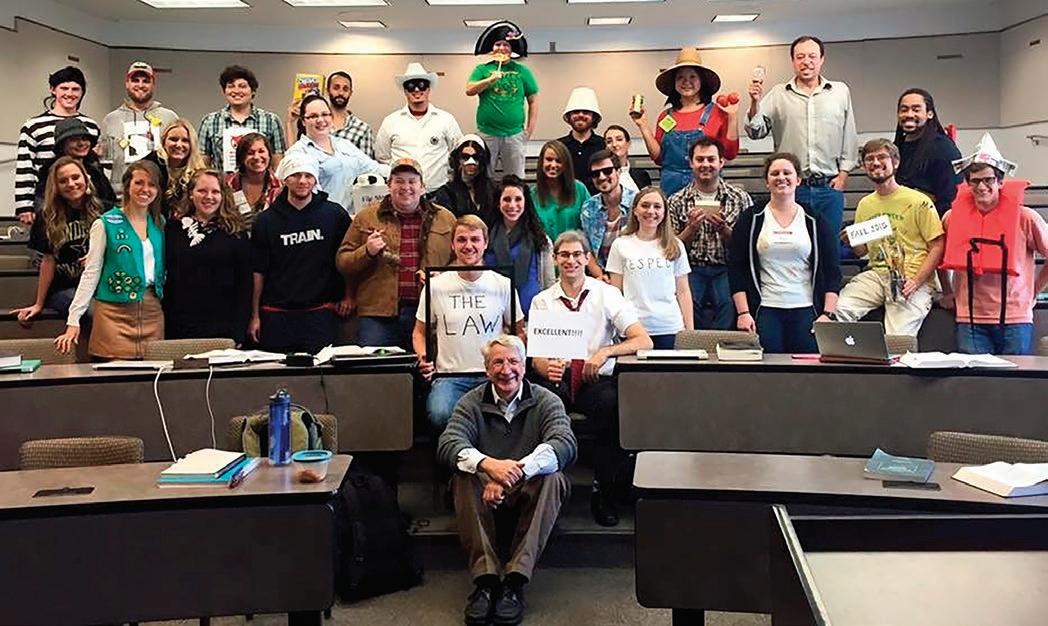
With a combined 84 years of teaching, Professors Coenen and Wells have had a profound impact on more than four decades of UGA Law graduates.
of Appeals for the Fourth Circuit, Coenen’s scholarship includes four books: The Common-Market Constitution: Text, History, and the “Dormant Commerce Clause” Rule (forthcoming); Principles of Constitutional Structure; The Story of The Federalist: How Hamilton and Madison Reconceived America and Constitutional Law: The Commerce Clause. He has published more than 35 articles in journals such as the Yale Law Journal, the Cornell Law Review, the Michigan Law Review, the Vanderbilt Law Review, the Northwestern University Law Review and the Duke Law Journal.
Over the years, he has been recognized for his teaching on multiple occasions. His UGA accolades include receiving the Josiah Meigs Award and being named a University Professor, which are counted among the university’s highest honors. He has been selected by law students on multiple occasions for the Ellington Award for Excellence in Teaching, the O’Byrne Memorial Award for Significant Contributions Furthering Student-Faculty Relations and the Brown Professionalism Award.
Coenen said his students have always given him energy and a sense of purpose, adding that his favorite UGA recollections center around his students. “Particularly important are the moments when I learned of student successes or joyful events in their lives. … I also smile when I think of the wacky things my students have done – like dressing up as me on Halloween.”
He said he senses his students perceived him as “having been a very challenging professor” but that he always tried to be challenging for the purpose of helping his students. “Most important of all, they always rose to the occasion.”
Coenen plans to stay in Athens as he has been “blessed with wonderful friendships and a strong sense of belonging.” He does hope to devote more time to public service work in his retirement.
Wells, who joined the law school’s faculty in 1978, has held the Carter Chair in Tort and Insurance Law since 2004.
Specializing in torts, federal courts and constitutional litigation, he is the author of Constitutional Torts, Constitutional Remedies: A Reference Guide to the United States Constitution, and Cases and Materials on Federal Courts. He has written more than 60 articles in leading journals such as the Cornell Law Review, the Duke Law Journal, the Virginia Law Review, the William & Mary Law Review, Constitutional Commentary and the Yale Journal of International Law.
He is a member of the American Law Institute and is an associate reporter for the institute’s Restatement of the Law, Constitutional Torts project that is examining the law of 42 U.S.C. § 1983.
Over the years, his teaching portfolio has included his scholarly specialties in addition to Insurance, Constitutional Law and European Union Law. Fluent in French, Wells has been a visiting professor at the University of Lyon (III) on six occasions, a professor at the Duke-Geneva Institute in Transactional Law and a visiting scholar at the University of Aix-Marseille. He also served as a judicial clerk for Judge John D. Butzner Jr. of the U.S. Court of Appeals for the Fourth Circuit after law school.
Of his career, Wells said he hopes to have accomplished “a reasonable amount as a teacher and a scholar.”
He added that his best UGA Law memory is of the day in November 1977 when Dean J. Ralph Beaird offered him a job, which he said he “gratefully accepted.”
Wells said what he will miss most about his time on the faculty is the opportunity to discuss legal issues with students and colleagues both in and out of class. As for what he will miss least, he said “dealing with the University of Georgia bureaucracy.”
In retirement, he plans to live primarily in Athens and continue to teach and write, “just not as much as before.”
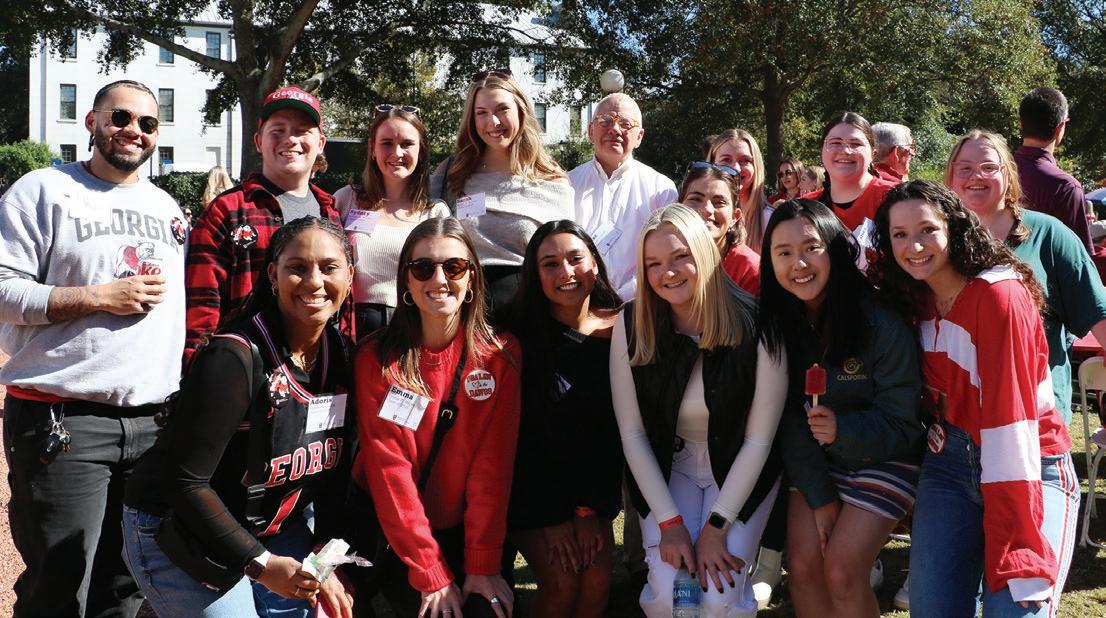
To ensure these legendary professors are forever honored for their contributions to UGA Law, several former students have established endowed funds bearing their names.

Nathan S. Chapman, holder of the A. Gus Cleveland Distinguished Chair of Law, has been promoted to associate dean for faculty development. In this role, he works to expand the scholarly influence of the law school and its faculty.
Teaching and writing in the areas of constitutional law, and law and religion, he is the co-author of Agreeing to Disagree: How the Establishment Clause Protects Religious Diversity and Freedom of Conscience (Oxford University Press). He is currently working on a variety of projects related to the history, theory and doctrine of religious liberty. His scholarship on constitutional law has been cited in numerous U.S. Supreme Court opinions.
In addition to service on the Georgia Chief Justice’s Commission on Professionalism for nearly 10 years, Chapman is a McDonald Distinguished Senior Fellow in Law and Religion (Emory Center for the Study of Law and Religion) and a Nootbaar Fellow in Law and Religion (Pepperdine School of Law).
Chapman, who joined the School of Law faculty in 2013, has been recognized by law students on multiple occasions with the Ellington Award for Excellence in Teaching and the Brown Professionalism Award, as well as selection as graduation faculty marshal.
Willow Tracy has been appointed the law school’s associate dean for clinical programs and experiential learning, and has been promoted to the rank of full clinical professor. As associate dean, she will oversee the work of the school’s 11 in-house clinics and seven externship programs.

Tracy joined the UGA Law faculty in 2012 to establish the school’s Business Law Clinic, which provides free legal services to small businesses, nonprofits, start-ups and entrepreneurs. The clinic helps business owners with a range of services such as forming and structuring entities like LLCs and corporations, drafting and reviewing contracts, writing bylaws and protecting intellectual property.
In addition to directing the Business Law Clinic, Tracy teaches Contract Drafting for Startups and New Ventures, Lifecycle of the Corporation, Law and the Ethics of Lawyering, and an undergraduate Business Law Practicum.
Previously, she worked for the National Health Law Program as a consultant and policy analyst, taught in the Legal Studies Department at the University of California, Berkeley, and practiced as an attorney for small- and medium-sized businesses.
Tracy earned her B.A., J.D. and Ph.D. from the University of California, Berkeley.
Assistant Professor Meighan Parker was chosen for the UGA Rural Engagement Workshop 2025 cohort. The program, which is limited to no more than 20 faculty members, supports collaborative research benefiting rural Georgia.
Parker’s research focuses on health law and policy, with an emphasis on the legal implications of novel telehealth and digital health technologies designed to democratize healthcare. Specifically, she studies the impact of these new technologies on the practice of medicine and access to care, especially in marginalized and vulnerable communities.
With respect to the Rural Engagement Workshop, her project will center around partnering with rural Black churches to establish telehealth spaces on church campuses to address possible healthcare gaps in their communities and legal hurdles related to these partnerships.

Parker came to the School of Law in 2024 after serving as a Bigelow Teaching Fellow and Lecturer in Law at the University of Chicago Law School, where she taught Legal Research & Writing. Before entering academia, Parker served as a managing associate at Sidley Austin and an associate at Ropes & Gray.

Diane Marie Amann, who is a Regents’ Professor of International Law and the holder of the Woodruff Chair in International Law, was in residence during her fall 2024 research-intensive semester in the United Kingdom and Ireland. At the University of Oxford, she served as a research visitor at the Faculty of Law Bonavero Institute of Human Rights and visiting fellow at Exeter College. At Trinity College Dublin, she was a visiting research scholar at the School of Law.
While abroad she spoke on child rights in the context of armed conflict and similar violence at the annual forum of the International Nuremberg Principles Academy in Germany. She also presented her scholarship on that issue and on the topic of women professionals in post-World War II international trials to academic audiences at her two host institutions and at Queen’s University Belfast, the University of Reading and the University of Warwick. She returned to the UK in spring 2025 to speak by invitation of the Oxford Union on world leaders’ immunities from criminal prosecution.
Amann, who also serves as a faculty co-director of the Dean Rusk International Law Center, is the author of more than 100 publications in English, French and Italian.
Her recently published scholarship includes: “Child-Taking” in the Michigan Journal of International Law, “A Nuremberg Woman and the Hague Academy” in the European Journal of International Law, “Children and the ICC Arrest Warrant against the President and the Children’s Rights Commissioner of Russia” in American Society of International Law Annual Meeting Proceedings and “What Figures Lurk on Madame Elysé’s Path? Reflections on Philippe Sands’ The Last Colony” in the Temple International & Comparative Law Journal
Thomas E. Kadri, who joined the UGA law faculty in 2020, has earned the rank of associate professor with tenure.
Kadri’s research focuses on torts and criminal law, with an emphasis on how technology, law and social norms enable and affect privacy, speech and abuse. His scholarship appears or is forthcoming in journals including the California Law Review, the Harvard Law Review Forum, the UCLA Law Review, the Texas Law Review and the Harvard Journal of Law & Technology
In 2021, he received a National Science Foundation grant to fund a $750,000 project on digital evidence and privacy rights. As a principal investigator for this interdisciplinary collaboration with computer scientists, he is researching whether artificial intelligence can constrain police discretion in searching digital devices while satisfying constitutional and statutory privacy laws.

Kadri also serves as an affiliated researcher and the legislative & policy director at the Clinic to End Tech Abuse at Cornell University, where he leads the organization’s advocacy efforts and advises federal and state legislators on laws to protect survivors of abuse.
Prosecutorial Justice Program Director Melissa D. Redmon has been elevated to the rank of clinical associate professor. She came to UGA in the spring of 2019 after working in the Fulton County District Attorney’s Office for more than 10 years. She tried more than 30 complex cases to completion and served as deputy district attorney of the Public Integrity Unit and as director of the Domestic Violence Policy and Trial Unit. In 2015, she was recognized as the Fulton County District Attorney’s Office Attorney of the Year.
Previously Redmon served as a senior assistant district attorney in Clayton County, worked with Metro Conflict Defenders in Fulton County and handled both criminal and civil matters at the law firm Lawton & Thornton.

Redmon has provided expert analysis to high profile media outlets such as USA Today, The New York Times, The Washington Post, Georgia Public Broadcasting and MSNBC.
Elizabeth Taxel (J.D.’09), who serves as the director of the Criminal Defense Practicum, has been promoted to clinical associate professor.
Since joining the law school in 2020, Taxel has broadened the reach of the practicum to serve more than 15 counties throughout Georgia. She created the school’s Prisoner Advocacy Project to provide legal advice, support and referrals to individuals who are incarcerated. Additionally, she launched a summer program to support law students working in public defender offices across the nation.

Assistant Professor Desirée LeClercq presented her research on international trade and labor law over the past year to a range of professional and academic audiences around the globe, including to the World Trade Organization in Switzerland and the Queen’s University Canada, as well as at the University of Michigan, Cornell University and Johns Hopkins University. She also testified before the U.S. International Trade Commission regarding the “United States Mexico Agreement Automotive Rules of Origin: Economic Impact and Operation, 2025 Report.”

Taxel has remained active in the legal community by serving as a pro bono expert consultant for public defenders on complex felonies. She also conducts trainings on litigation skills and strategy for members of the defense bar.
In 2023, she authored a report for the United Nations Expert Mechanism to Advance Racial Justice and Equality in Law Enforcement’s visit to Atlanta, focusing on racial disparities and pretrial detention in DeKalb County.
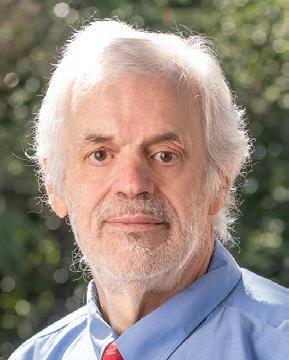
Additionally, she published “Labor Strife and Peace” in the UC Irvine Law Review, “Gender-Based Violence at Sea” in the Cornell International Law Journal and “Enforcement of the U.S.-Mexico-Canada Agreement Rapid Response Mechanism: Views From Mexican Auto Sector Workers” (coauthored, Cornell University Center of Applied Research on Work, 2024), among others.
LeClercq, who came to UGA in the fall of 2024, serves as a faculty codirector of the Dean Rusk International Law Center and the faculty adviser for the Georgia Journal of International and Comparative Law. During the spring, she led the school’s International Law Colloquium Series, which included 12 scholars presenting works in progress related to international economic law.
Veterans Legal Clinic Director Alexander W. “Alex” Scherr has been awarded the inaugural Career Achievement Award by the Association of American Law Schools Externship Committee. This recognition honors his “enduring contributions, mentorship, and dedication” that have shaped the externship community and advanced the field of experiential learning.
Since joining the UGA faculty in 1996, Scherr has created or significantly shaped many of the law school’s core clinical offerings, including: the Civil Externship, the Corporate Counsel Externship, the Public Interest Practicum, the Wilson Family Justice Clinic, the Community Health Law Partnership Clinic and the Veterans Legal Clinic, which he currently directs. From 2016 to 2018, he served as the school’s associate dean for clinical programs and experiential learning.
Scherr is the author of Learning From Practice: A Text for Experiential Legal Education and Green’s Georgia Law of Evidence. He has served as president of the Clinical Legal Education Association and chair of the AALS Clinical Advisory Committee. He has also organized many regional and national conferences on clinical education and has been involved with the development and implementation of the ABA’s standards for externship courses. He has served on the board of the National Law School Veterans Clinic Consortium. Presently, he is an editorial board member of the Clinical Law Review in addition to being a drafter of the Multistate Performance Test for the National Conference of Bar Examiners.

Hosch Professor & Meigs Distinguished Teaching Professor Lori A. Ringhand’s co-authored book Supreme Bias: Gender and Race in U.S. Supreme Court Confirmation Hearings (Stanford University Press, 2023) was selected as one of the Top 10 Choice Reviews 2024 Outstanding Academic Titles from the past year. This prestigious list reflects the best scholarly titles reviewed by Choice during the previous calendar year. The book also received a Pritchett Award, which recognizes the best book on law and courts published during the previous year.
Her other recent scholarship includes: “Gender, Race, and Interruptions at Supreme Court Confirmation Hearings” in the American Political Science Review, “The Court and the Constitution” in the Wisconsin Law Review, “Contextualizing Corruption: Foreign Financing Bans and Campaign Finance Law” in the Cardozo Law Review and “Constructing the Supreme Court: How Race, Ethnicity, and Gender Have Affected Presidential Selection and Senate Confirmation Hearings” in Polity
This past year she presented her work at York University in Toronto, Emory University, the University of Wisconsin and at the Knight Election Law Forum.
A nationally recognized U.S. Supreme Court scholar, Ringhand teaches Constitutional Law and Election Law. She joined the law school faculty in 2008.
Stembler Family Distinguished Professor in Business Law Christopher M. Bruner recently published several peer-reviewed works on corporate and financial law, including “Corporate Personhood, Corporate Rights, and the Contingency of Corporate Law” in Transnational Legal Theory, “National Identity and Economic Development in Market-Dominant Small Jurisdictions” in the Journal of Law and Political Economy and “Developments and Debates on Corporate Sustainability in the US” in European Company Case Law. He also authored “Managing Fraud Risk in the Age of AI” in an edited volume titled Fraud and Risk in Commercial Law

This academic year, Bruner has presented to audiences in the United States and abroad, including at George Washington University, the University of Maryland, the University of Richmond, Bucerius Law School (Germany), Rennes 2 University (France) and the University of Oslo (Norway).
A faculty co-director of the Dean Rusk International Law Center, Bruner joined the School of Law’s faculty in 2017. His books include The Corporation as Technology: Re-Calibrating Corporate Governance for a Sustainable Future (Oxford University Press, 2022), Re-Imagining Offshore Finance: Market-Dominant Small Jurisdictions in a Globalizing Financial World (Oxford University Press, 2016) and Corporate Governance in the Common-Law World: The Political Foundations of Shareholder Power (Cambridge University Press, 2013).
Clinical Services and Research Librarian Amy Taylor was elevated to the rank of Librarian III.
She joined the Alexander Campbell King Law Library in 2018, and she leads the unit’s outreach to the law school’s clinical programs in addition to teaching Legal Research, Advanced Legal Research and Georgia Legal Research. From August 2023 to June 2024, she served as the interim associate director of research services.
Active in the American Association of Law Libraries and the Southeastern Chapter of the American Association of Law Libraries, she has presented at annual meetings in recent years on the topics of active learning implementation and data visualization.

In 2019 she was the recipient of a UGA Affordable Course Materials Grant to help the transition from costly textbooks to open educational resources for her courses.
Pamela Foohey, who teaches in the areas of bankruptcy and secured transactions, was named the Allen Post Professor in early 2025.

A newly elected fellow of the American College of Bankruptcy, Foohey focuses her scholarship primarily on empirical studies of bankruptcy and related parts of the legal system, combining quantitative and qualitative techniques. She serves as a co-investigator on the Consumer Bankruptcy Project, a long-term research project studying persons who file bankruptcy. Data from this research project serve as the basis of her recently published co-authored book Debt’s Grip: Risk and Consumer Bankruptcy (University of California Press, August 2025). Her work in business bankruptcy focuses on nonprofit entities, with a particular emphasis on how religious institutions use reorganization. Data from this project are included in her in-progress book Forgive Us Our Debts: How Black Churches Use Bankruptcy to Survive, forthcoming with the University of Chicago Press.
Foohey, who came to UGA in 2024, is also a co-author of Secured Transactions: A Systems Approach, a leading textbook on the topic, and of Commercial Transactions: A Systems Approach. Leading journals publishing her work include the Virginia Law Review, the Southern California Law Review, the Boston College Law Review, the Notre Dame Law Review and Law & Contemporary Problems, among others.
Allison G. Hale (J.D.’89) was presented with the UGA Award for Excellence in Teaching earlier this year. The honor recognizes faculty whose time is primarily dedicated to instruction, promoting pedagogical innovation and providing an engaging environment for student learning. Notably, she was one of only two faculty members campus-wide to be selected.

Hale, who has been a member of the law school faculty since 1992, teaches Legal Writing to first-year law students and serves as the school’s director of academic enhancement, teaching in the pre-orientation Early Start program and providing a series of workshops called “OneL” to help first-year students develop the skills necessary to succeed in law school.
Hale also serves as the faculty advisor for students pursuing the Master in the Study of Law and teaches Introduction to the American Legal System and Legal Writing & Analysis for this cohort of students.
She is a member of the Georgia Bar Association, the Association for Academic Support Educators and the Legal Writing Institute.
Matthew I. Hall – Associate Professor – Brown Professionalism Award
Jean Goetz Mangan (J.D.’11) – Lecturer & Director of Bar Passage –Watson Award for Outstanding Legal Research or Writing Instructor
Rob McNiff (J.D.’02) – Clinical Assistant Professor – Lanier Award for Excellence in Clinical Education
John B. Meixner Jr. – Assistant Professor – Ellington Award for Excellence in Teaching and Graduation Faculty Marshal
Peter B. “Bo” Rutledge – Talmadge Chair – O’Byrne Memorial Award for Significant Contributions Furthering Student-Faculty Relations and Graduation Faculty Marshal
Anthony E. “Tony” Waller (J.D.’93) – Assistant Dean for Career Development – Outstanding Staff Member
Gregory L. “Greg” Roseboro (J.D.’87) – Adjunct Professor – UGA Law Excellence in Undergraduate Education Award
Victoria J. Haneman has been appointed the new holder of the Verner F. Chaffin Chair in Fiduciary Law, after serving as a visiting professor at UGA during the 2024–25 academic year. She will teach Estate and Gift Tax, and the Estate Planning Seminar.
Haneman came to UGA from Creighton University, where she was a member of the law school’s faculty for seven years. In 2023 she was appointed the associate dean for research and innovation. She also held the Frank J. Kellegher Professorship of Trusts & Estates and served as the interim director of the health law program for the 2023–24 academic year.

Specializing in taxation, wills, trusts and estates, and business associations, Haneman has published extensively in flagship and specialty law reviews, including the Boston College Law Review, the Wisconsin Law Review, the North Carolina Law Review, the Wake Forest Law Review, the Harvard Journal on Legislation and the Columbia Journal of Gender and Law. She has also coauthored four books, including Planning for Large Estates; Questions & Answers: Wills, Trusts, and Estates, 4th ed.; Federal Taxes of Gratuitous Transfers: Law & Planning, 2d ed.; and Making Tax Law.
A recipient of several scholarship and teaching awards, Haneman has held leadership positions in the Women in Legal Education, Trusts and Estates, and the Aging and the Law sections of the Association of American Law Schools.
Haneman earned her B.A. from Arizona State University, her J.D. magna cum laude from California Western School of Law and her LL.M. in Taxation from New York University.
Specializing in criminal law, criminal procedure and evidence, William Ortman came to UGA Law as a professor with 12 years in the legal academy.
Most recently, he was at Wayne State University Law School, where he was the David Adamany Research Scholar (2024–25) and the Edward M. Wise Research Scholar (2020–23). While at Wayne State, Ortman was also recognized with multiple teaching awards. He previously held positions as a visiting professor at the University of Michigan Law School and as a Climenko Fellow and Lecturer on Law at Harvard Law School.

Ortman’s scholarship focuses on the institutional and legal design of criminal adjudication. His recent work includes “Confession and Confrontation” in the
California Law Review and “Cliff Running” in the Washington University Law Review (forthcoming). His work has also appeared in the Columbia Law Review, the University of Pennsylvania Law Review, the Boston University Law Review, the Vanderbilt Law Review, the Michigan Law Review and the Stanford Law Review.
Before entering the legal academy, Ortman practiced as a criminal defense lawyer and commercial litigator at Weinhardt & Logan and Belin McCormick in Des Moines, Iowa. He also clerked for Judge David S. Tatel of the U.S. Court of Appeals for the D.C. Circuit.
Ortman earned his J.D. with highest honors from the University of Chicago Law School, where he served as an articles editor on the University of Chicago Law Review. He holds a B.A. with highest honors from Swarthmore College.
Anne M. Tucker became the holder of the Robert Cotten Alston Chair in Corporate Law at UGA Law this fall.
Teaching and researching in the areas of contracts, corporations, securities regulations and investment funds, she came to Athens from the Georgia State University College of Law, where she was a professor and served as the associate dean of research and faculty development.
Tucker is the author of Business Organizations and more than 25 articles in leading law journals. Her recent work includes: “Settlement as Construct: Defining and Counting Party Resolution in Federal District Court” in the Northwestern Law Review and “Text, Tone, and Legal Language: Analyzing Mutual Fund Disclosure Sentiment” in the American Business Law Journal Her scholarship has also been published in the Harvard Business Law Review, the University of Chicago Business Law Review, the Yale Law Journal Forum, the Columbia Business Law Review and the Journal of Corporate Law

Recognized for her teaching and scholarship on multiple occasions, Tucker is a member of the American Law Institute and the National Conference of Bar Examiners. She is presently an affiliated researcher with the Impact Finance Research Consortium, which is sponsored by the Harvard University Business School, the University of Chicago Booth School of Business and the University of Pennsylvania Wharton School.
Tucker earned her B.A. summa cum laude from Butler University and her J.D. magna cum laude from Indiana University, where she served as the senior managing editor of the Federal Communications Law Journal and was inducted into the Order of the Coif.

Teaching in the area of criminal law, Eileen Prescott joined the School of Law faculty in the fall of 2025.
She came to the School of Law from Wake Forest University, where she served as the project director for the law school’s Accountable Prosecutor Project. For four years, Prescott led research in collaboration with students on prosecutor accountability and published the National Report of the State Law on Prosecutor Immunity
Her scholarship includes “Absolutely Unnecessary Immunity” forthcoming in the Nebraska Law Review and “Carceral Control and Choice Paralysis” forthcoming in the Touro Journal of Race, Gender, and Ethnicity
Previously, she served as an assistant district attorney in the Federal Litigation Unit of the Philadelphia District Attorney’s Office and was a judicial clerk for Chief Judge James E. Shadid of the U.S. District Court for the Central District of Illinois.
Prescott earned her bachelor’s degree summa cum laude from Bradley University and her law degree from the University of Chicago, where she served on the Chicago Journal of International Law
Anjelica C. Violi presently serves as the Alexander Campbell King Law Library’s student engagement librarian. She is responsible for the development and implementation of library activities and programs for law students and serves as the primary liaison between the law library and the student body.
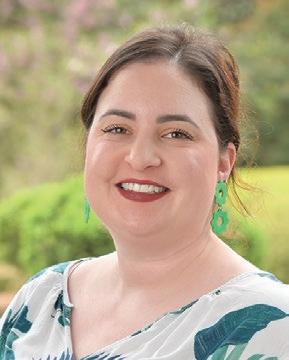
She came to UGA in 2024 after serving as a staff attorney for the Indiana Gaming Commission, where she communicated and managed public records requests and license verifications, along with managing statewide patron exclusion lists and engaging in patron services. Violi also oversaw the revocation and suspension of occupational licenses for the commission.
Previously, Violi worked as a deputy attorney general in the Office of the Indiana Attorney General, a staff attorney at the Indiana Department of Child Services and as a contract document review attorney for PricewaterhouseCoopers, Legility (Consilio) and Knowable.
She earned two bachelor’s degrees from Indiana University – Bloomington, a J.D. from Valparaiso University Law School and a M.L.I.S. from Indiana University – Indianapolis.
Sherrie L. Hines (J.D.’09) became a lecturer at the School of Law during the spring semester.
Previously, she worked for more than seven years in the AthensClarke County Attorney’s Office, having served as a deputy chief attorney.
From 2009 to 2015, Hines served as an assistant public defender in the Western Judicial Circuit Public Defender Office. She also worked for two years at the Institute for Continuing Legal Education.
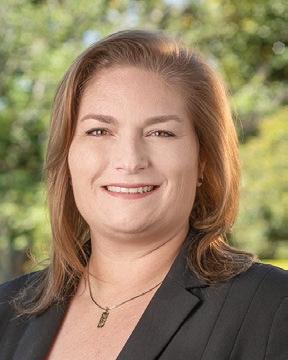
While at the Athens-Clarke County Attorney’s Office, she prosecuted all of the animal services ordinance violations and worked with the School of Law’s Practicum in Animal Welfare Skills to overhaul the government’s animal services ordinances, which were adopted in 2022. Additionally, her position involved collaborating with PAWS to develop animal welfare classes to educate citizens and reduce recidivism. Her work also involved a wide range of local government law topics.
She earned her bachelor’s degree summa cum laude and her law degree cum laude from UGA.

Members of the Class of 2006 at the annual UGA Law Black Alumni Reception held in February include: (back row) Elliott Stiles, (middle row, l. to r.) Tamika Montgomery-Reeves, Bisa Brogdon, Ayotundé Ezekiel, M.J. Blakely, Brock Brockington, (front row, l. to r.) Santana Flanigan, Tremesha Willis-Burns, Veronica Richardson, Kimberly Sheridan, Stacee White, Haniffe Carrington and Shariyf Muhammad. Photo courtesy of M. Mixon Photography.
Three alumni in Georgia government came back to campus in October to speak to students as part of the Across the Aisle fireside chat.
Pictured with UGA President Jere Morehead (J.D.’80) (right) are Senator Blake Tillery (J.D.’10) (left) and Georgia State Representatives Stacey Godfrey Evans (J.D.’03) and Robert Leverett (J.D.’89).

For 2025–26, School of Law alumni leaders are: (l. to r.) Board of Visitors
Chair Marlan B. Wilbanks (J.D.’86), Law School Alumni Council President Christina “Christy” Hull (J.D.’00) and Young Alumni Council President Gretchen Edelman (J.D.’20).


Alumnus Brian Cain (J.D.’87) (left) and his wife, Kim, enjoyed talking with second-year student Avery Hill and first-year student Jennifer Dorame (right) at the Law School Alumni Council reception in October.


Class of 2011 graduates J. Thomas “Tom” and Rebecca F. Clarkson often fondly look back at their legal education and their most memorable law school experience: meeting each other.
On the first day of law school, Tom discovered that professors typically assign seats based on where students initially sit. With this in mind, Tom entered his civil procedure class, walked past many empty seats across the auditorium and sat next to Rebecca, who had arrived to the class early.
“I thought it was a very romantic gesture,” Tom said. “The way Rebecca tells it, of course, is ‘Who is this guy? Of all the seats, he’s sitting next to me? At least leave one open!’ But I guess all’s well that ends well, now three kids later.”
The Clarksons said they are really excited about the life they are building with their children, ages 8, 6 and 2. Having three kids to come home to provides a source of grounding and helps them keep a good perspective on things.
They also individually assist one another as they balance the dual demands of family and careers. When Tom had the opportunity to join the U.S. Department of Justice as a federal prosecutor, Rebecca sacrificed a job in Charlotte, North Carolina, to move to Savannah, Georgia, with him. And later, when Rebecca was able to transition to an in-house role, Tom agreed to move to Atlanta, further demonstrating their commitment to each other’s professional growth.
In addition to backing one another’s career goals, the couple’s legal education and careers allow them to understand and care for each other in a distinct way when challenges arise.
“I think it’s a good place where we understand enough of what each other is doing, but we’re not doing the same things,” Rebecca said. “We’re not under the exact same stress, but we understand enough to know when the other person needs help or needs a reminder of the bigger picture.”
Tom and Rebecca make efforts to support not only their family but also the School of Law. They recently established the Rebecca and J. Thomas Clarkson Family Endowment.
“We wanted to do something that would further help the law school be as prepared as they could to attract and retain the best talent possible,” Tom said. “I think the law school has done a phenomenal job of bringing alums back to invest, both financially as well as with their time, and to be able to play a small part in that is a pretty cool thing.”
The Clarkson Family Endowment will benefit the school’s clinical and experiential learning programs, especially the Appellate Litigation Clinic and the Business Law and Ethics

Program, in addition to funding student scholarships and fellowships.
“The law school has been really significant to both of us and our success, and we really do believe it’s got great leadership and is accomplishing great things,” Rebecca said. “We wanted to be a part of continuing that legacy and helping the law school be the best it can be.”
Rebecca currently works as associate general counsel for Credigy, a specialty finance company, and Tom is a founding partner of the law firm Griffin Durham Tanner & Clarkson. They said their time in law school prepared them well for their positions.
The pair credits the School of Law’s emphasis on affordability for giving them the freedom to pursue opportunities that set them up for professional fulfillment.
“Being able to make more choices about what we wanted to do with our careers right out of law school because we weren’t just saddled with debt, I think it has impacted our whole lives and will continue to do so,” Rebecca said.
They believe that an affordable legal education will also benefit future legal leaders, as it allows students more freedom to pursue different opportunities without having to worry about financial strain. Tom encourages law students to take advantage of this flexibility whenever they can.
Rebecca said sharing her knowledge and experience with young professionals has been one of the most rewarding parts of her legal practice – teaching the attorneys, paralegals and legal assistants with whom she has worked. She has also enjoyed serving as a mentor through her sorority, Alpha Delta Pi.
Both Tom and Rebecca are optimistic about the future of Georgia and the legal profession.
“There’s a lot of opportunity – for the law school, for our family, for the state of Georgia as a whole – to chart a real positive future for the next generation,” Tom said. “I’m excited to play a part in that through setting up this fund with Rebecca for the law school and continuing to see the law school and the state emerge as one of the leading lights in the years to come.”
—Mason A. Brock
Born in Harlem, Georgia, Randolph “Randy” Frails (J.D.’97) has practiced law in the Augusta area for nearly 30 years. As founding partner of the law firm Frails & Wilson, he has supported his community both through work and involvement.
“I think the key to success for my law firm has been a willingness to invest in people and reinvest in the community,” Frails said. “You have to be an active member of the community. You also have to be willing to invest in the people you hire to achieve stability and growth.”
Although Frails is proud of his firm’s accomplishments, he finds the most meaningful aspect of his work is the impact it has on both clients and colleagues.
“I certainly like to win when I go to court, but the most important thing is ensuring that our clients are satisfied that you put forth maximum effort to achieve their objectives,” Frails said. “I also get just as much satisfaction when I see an employee – whether it’s a paralegal, another attorney or an administrative employee – who is able to take care of their family because of the efforts of our law firm.”
Frails said his path to a legal career was not typical. The fifthborn of eight children, he was the first in his family to attend college – something his father, who had a third-grade education, and his mother, who had an eighth-grade education, strongly encouraged.
“They always encouraged us to get an education, because they did not have the opportunity to go to school,” Frails said. “They were my greatest influence.”
After graduating from high school in 1974, Frails joined the U.S. Navy. While on active duty, he enrolled in college courses as often as he could and subsequently graduated from Southern Illinois University with a degree in aviation management.
He spent 20 years on active duty in the military, ultimately becoming a senior chief aviation electronics technician. While the military motivated him and gave him structure and discipline, he began to feel constrained by his role and decided to pursue law school.
“Even though I enjoyed the Navy, I felt a little held back while I was there,” Frails said. “I thought my growth was not what it should have been. It was one of those things where I thought, ‘Okay, this is good, but I think there’s something better,’ and UGA offered it to me.”
He picked UGA both for its location in Georgia and for its affordability. Frails said he received a scholarship that enabled him to focus on law school without worrying about debt.
Frails began his first year of law school at 37 years old. Starting at an older age, he faced the challenge of balancing academics with the responsibilities of taking care of his family.
“I was at least 10 years older than most of the people who I was in law school with, and the fact that I attended college in a nontraditional fashion – the rigors of getting through all the courses and writing – it took a toll, but I was determined.”
UGA had both a professional and personal impact on Frails. The school connected him with a lifelong network that has supported him to this day.

“It really has been a part of my life since I graduated law school. I never thought that being associated with UGA would have such a great impact on me throughout my life and throughout the practice of law,” he said.
Frails has remained closely connected to the School of Law throughout his career as a member of the Law School Alumni Council. He sees his involvement as a way to honor the support he received from the school.
“I felt a profound duty after I graduated from law school to give back because of what they had done for me,” Frails said.
Through the LSAC, Frails participates in discussions regarding the law school with both other council members and law school alumni.
“I really think that it allows me to make a difference,” Frails said. “I think the law school takes the input of the alumni council seriously. I think we serve an important function in how the law school operates and how it moves forward. It is an important role that we serve, and I am honored to have participated for all these years.”
Frails also reflected on the growth both he and his community have experienced over time. That is part of what motivates him to be involved and help others.
“I grew up in Columbia County when it was mostly rural and not as economically advanced as it is today. We, as a family, did not have indoor plumbing until 1970 when I was age 14. We got our drinking water from a well with a pulley,” Frails said. “When I look at my life’s accomplishments because of the UGA School of Law, I just feel the need to give back as best as I can.”
His commitment to service continues to guide his decisions both as a lawyer and as a member of the Augusta community. He hopes other alumni also find fulfillment in supporting their own communities.
“Give back to UGA, give back to your community, because people need help through life to travel that road you’ve already traveled,” Frails said. “If you are blessed to be able to graduate from law school, land a good job or find your passion, helping someone else along the way can give you great satisfaction.”
—Mason A. Brock
This past summer, Timothy H. “Tim” Lee (J.D.’10) completed his first year as assistant vice president and senior legal counsel at AT&T. In this role, he manages large, complex commercial litigation involving the telecommunications company.
“You get to help identify issues before they become litigation,” Lee said of his position. “You get to think more broadly about the company’s legal strategy, and you’re really embedded with the business and your internal clients in a way that would be hard in any other type of legal job.”

Lee feels particularly invested because of the people with whom he works. Lee said every day of his work is different and full of unexpected challenges, but a strong team dynamic makes those challenges manageable.
“I get to be a part of a really good team of people who put the mission, the customers and the team ahead of themselves,” Lee said. “And when you work with people who are like that, who really care about their work and work really hard, it’s a really fantastic setup.”
Lee’s career path prepared him well for his current position. He built a robust career in litigation, starting as an associate at King & Spalding, then serving as an assistant U.S. attorney before returning to King & Spalding, where he became a partner.
Throughout his career, Lee credits strong connections with shaping his professional development.
“While, of course, the law matters – the substance, the rules, the statutes – people can underestimate how much our profession is driven by people and relationships,” Lee added.
He began building those relationships at the School of Law, where he found lasting value in creating a community with his peers.
“Georgia Law is such a collaborative place, and it is a place that has a sense of community, where people work well together,” Lee said. “I think experiencing that sort of culture in law school was really helpful for my role now where you’re always working collaboratively with people in high stress situations.”
As a student, Lee connected with mentors who have continued to guide him beyond law school, especially former School of Law Dean Peter B. “Bo” Rutledge, who helped Lee navigate clerkship opportunities with Judge Lisa Godbey Wood (J.D.’90) in the U.S. District Court for the Southern District of Georgia and Judge Susan Black in the U.S. Court of Appeals for the Eleventh Circuit.
“I don’t think I made any decisions in law school without running it by him first, and that has continued throughout my career,” Lee said. “He started as a mentor in law school and continues to be a friend and confidant.”
Lee also remains close with Judges Wood and Black, both of whom have continued to be trusted sources of support and perspective.
“When I graduated from law school – and when my clerkships ended – it was really just the start of those relationships, as opposed to the end, and they’ve just been huge influences ever since,” Lee said.
He also built meaningful relationships with School of Law alumni through his role as president of the Law School Alumni Council.
“I felt a lot of gratitude for law school. And [the LSAC] was an opportunity to give back in a small way,” Lee said. “It’s been really rewarding. It’s given me a glimpse into what it takes to become a law school like UGA Law – all the planning, the giving, the really hard work that goes on behind the scenes.”
He added that one of the best parts of his role in the LSAC is interacting with current law students during council meetings in Athens.
“Knowing that my work plays a small role in supporting students – and we get to serve as resources for students – that’s very rewarding,” Lee said. “I think all of us on the board want to be a positive influence on the next generation of law students.”
Lee is optimistic about the future of the law school under its new dean, Usha R. Rodrigues – a professor he remembers vividly from his own time as a law student.
“When I heard that [Rutledge] was stepping down, [Rodrigues] was the first person who came to mind [as a replacement candidate],” Lee said. “If you’ve ever taken a class with her, she is so enthusiastic about the stuff she teaches, and that really carries over to her work as dean. I really think alums and students should be excited about Dean Rodrigues.”
Though his career has evolved across several sectors of the legal profession, Lee remains most proud of the life he has built outside of his work with his wife and three children, ages 7, 5 and 2. He said balancing the demands of his work with his family can be challenging, but having a good team – both at home and at work – helps him navigate all of his responsibilities.
Reflecting on the path he has taken since graduating from law school, Lee appreciates the growth each stage of his legal career has brought.
“As a lawyer, the privilege of being a law clerk to federal judges, serving as a federal prosecutor, working my way to partnership at a large law firm and then being part of this great legal department at AT&T, I’ve gotten to wear a lot of different hats as a lawyer,” Lee said. “It’s rewarding and interesting, and I am grateful for all of those opportunities.”
—Mason A. Brock

The School of Law recently bestowed the Distinguished Service Scroll Award, the Law School Alumni Council’s highest honor, on 1989 graduate Yvette K. Daniels and former School of Law Dean Peter B. “Bo” Rutledge for their outstanding dedication and service to the legal profession and the law school. Additionally, Carson M. Alexander (J.D.’17) was presented with the Young Alumni of Excellence Award.
Daniels currently serves as the director of university relations in the Division of Workforce Management for the Georgia Department of Public Health. She previously served as the DPH director of health promotion and was responsible for several vital public programs. During her 25 years in state government, she also served as a division attorney and legislative director.
While living in Jacksonville, Florida, she worked as an assistant state attorney and was responsible for prosecuting sex offenses against children and women.

Daniels, who was the first Black woman president of the UGA Alumni Association, served as the 77th president of the group from 2021 to 2023. She presently serves as a trustee for the UGA Foundation Board and is a member of the UGA School of Public and International Affairs Board of Visitors.

A Double Dawg, Daniels earned her bachelor’s degree in political science in 1986. She is a Leadership Georgia graduate, and she serves on the Morehouse School of Medicine Prevention Research Center Community Coalition Board. She is also the past president of the Stone Mountain chapter of Jack and Jill of America.
Dawn D. Bennett-Alexander, an associate professor emeritus in the UGA Terry College of Business Legal Studies Program, presented Daniels with her honor.
Rutledge, holder of the Talmadge Chair of Law, served as dean of the School of Law from Jan. 1, 2015, to Dec. 31, 2024.
Under his leadership, the school achieved back-to-back Top 20 rankings by U.S. News & World Report and was named the nation’s Best Value Law School for five out of the past seven years by National Jurist.
Rutledge joined the UGA law faculty in 2008, previously serving as associate dean for faculty development and winning multiple teaching awards. He was a Fulbright Professor at the University of Vienna Law School, and he is presently a member of the Council on Foreign Relations.


A former U.S. Supreme Court judicial clerk, Rutledge is the author of Arbitration and the Constitution and co-author of International Civil Litigation in United States Courts. His work has been published by Yale, Oxford and Cambridge university presses.
He earned a B.A. magna cum laude from Harvard, an M.Litt. in Applied Ethics from the University of Aberdeen and a J.D. with high honors from the University of Chicago, where he was executive editor of the University of Chicago Law Review and a member of the Order of the Coif.

Gordon Woodward, who is a partner and chief investment officer at Kohlberg & Company in New York, presented Rutledge his award. Woodward and Rutledge were college roommates.


Alexander is a partner at Alexander & Alexander Attorneys at Law focusing on personal injury law. She was recently sworn in as a parttime associate municipal judge in Springfield, South Carolina.
Previously, Alexander was an assistant solicitor for the South Carolina 2nd Judicial Circuit and a judicial clerk for Chief Administrative Judge Brian M. Gibbons with the South Carolina 6th Judicial Circuit. She also served as a staff attorney for Judge J. Wade Padgett and Judge Daniel J. Craig, both with Georgia’s Augusta Judicial Circuit.
She is actively engaged in her local community of Barnwell, South Carolina, as chair of the Barnwell County Accommodations Tax Committee and as a member of the advisory board for A New Direction YouthBuild.
Alexander earned her undergraduate degree from Augusta University. During law school, she was president of the Class of 2017, a member of the mock trial team and the senior managing editor of the Georgia Journal of International and Comparative Law.

William H. “Wil” Alexander (J.D.’16), who is her husband and also her law firm partner, presented her award.
School of Law Athens, Georgia 30602-6012 www.law.uga.edu
Jere W. Morehead UGA President
Jill S. Walton UGA Vice President for Development and Alumni Relations
Usha R. Rodrigues School of Law Dean

